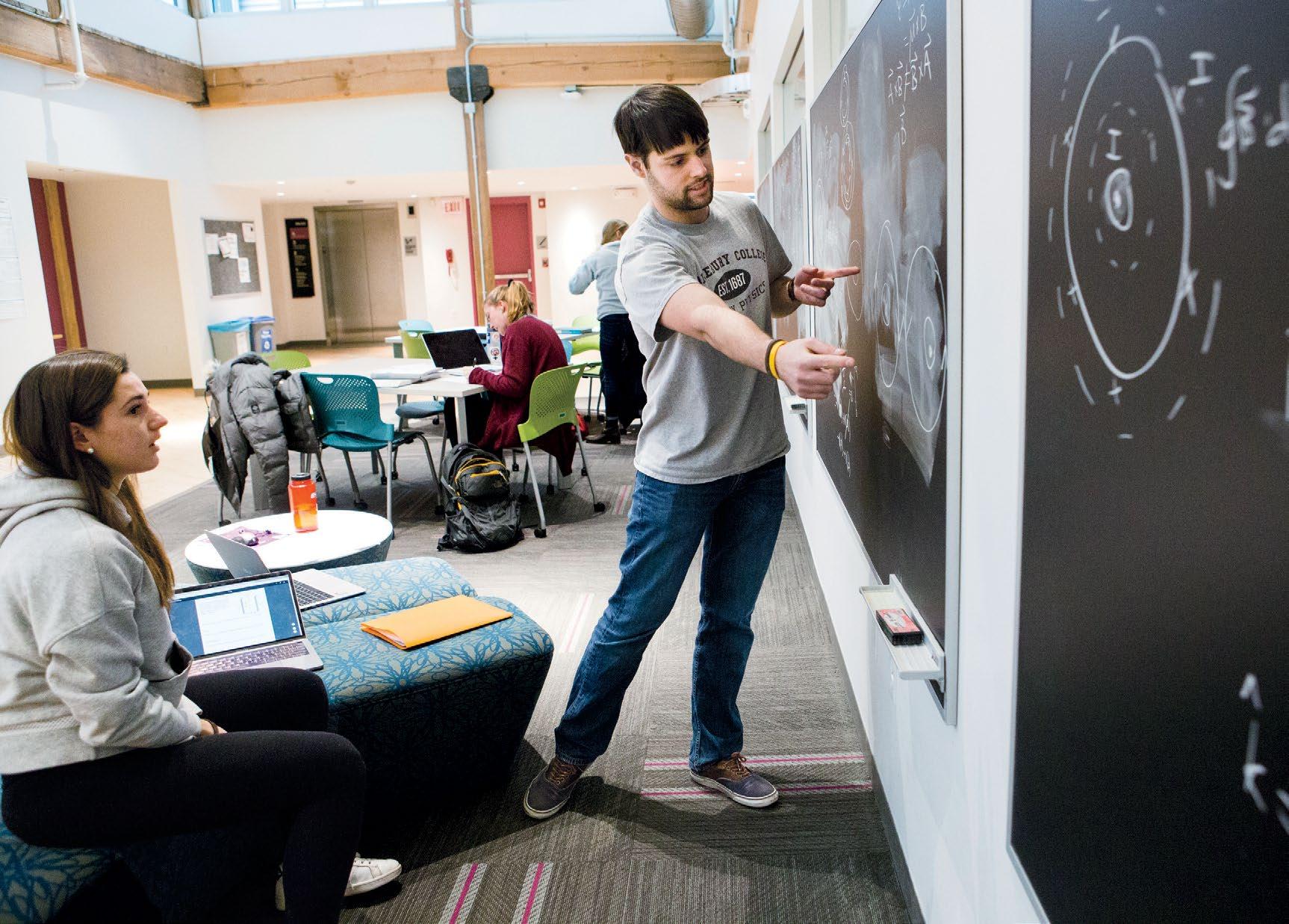Which Engineering Field is

Co-ops: Take
Advice from a
for


Which Engineering Field is

Co-ops: Take
Advice from a
for

This magazine will introduce you to Tufts Engineering—through stories, not just stats. Most of what you’ll read was written by current students. Alongside them, you’ll step into projectbased courses, tour makerspaces, dig into fascinating research, and chat with potential classmates in the light-filled atrium of the Science and Engineering Complex. Along the way, you might notice: Tufts engineers are collaborative, innovative, and kind. They are engaged in social impact and entrepreneurship. They create like the world depends on it. This is Tufts Engineering; explore it.
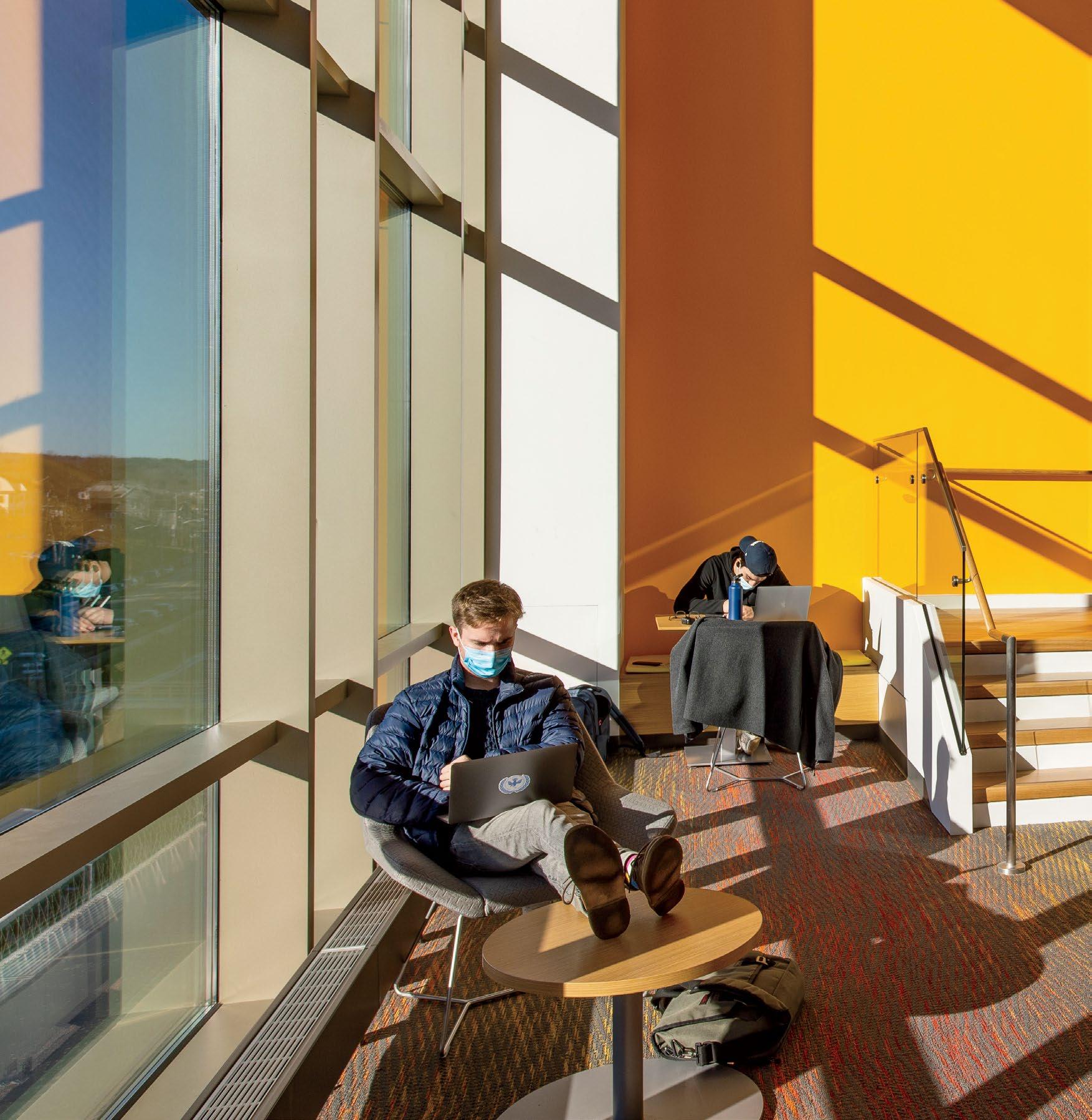
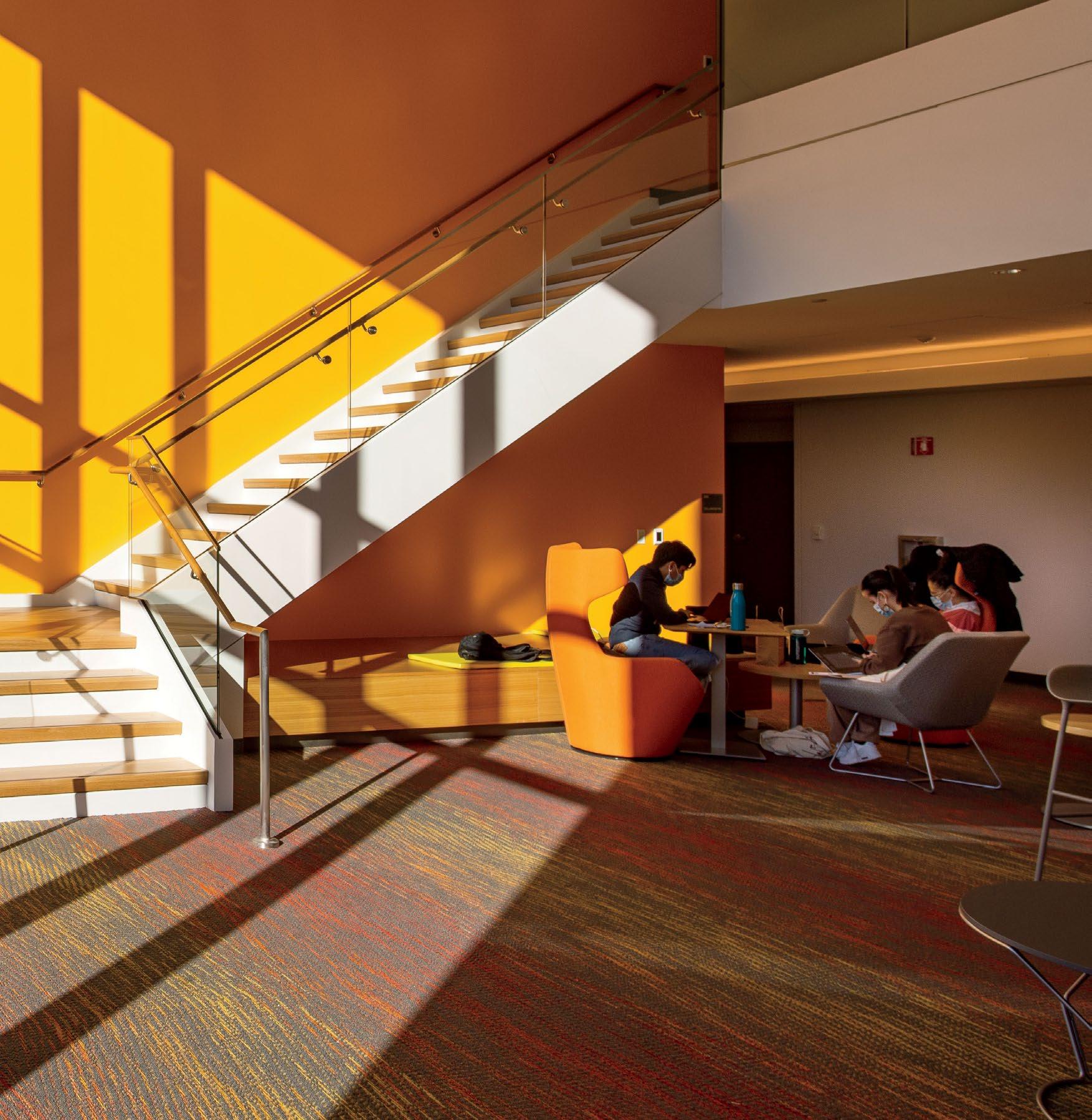
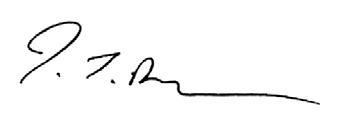
JUMBO ENGINEER is our introduction to an important component of our community, the Tufts University School of Engineering.
Embedded in a tier-one research university that is also a liberal arts college, the School of Engineering is a distinctively innovative place. It is a diverse community of students working in close partnership with expert faculty members in challenging classes and on cutting-edge research projects. It is one of the many places at Tufts where students apply their knowledge to real-world challenges, but one of the few where students speak a shared STEM language to do so.
As you learn more in the pages ahead about how Tufts approaches engineering, allow me to illuminate some of the traits I nd to be most special about our program:
Our engineers are a diverse group. We are proud of the diversity of our engineers. Tufts is committed to building a diverse student body across the university, and our engineers are an important part of that commitment. In recent years, 49% of our entering engineering cohort has been composed of women, and students of color comprise over 47% of our US students. One out of every six engineers in our most recent entering class will be among the rst generation in their family to graduate from a four-year college.
As you collaborate in teams and small groups on many of your engineering projects, you will be expected to work with and learn from peers who bring different perspectives than you to the problems at hand. Because of this, you will graduate ready to enter an increasingly diverse workforce and tackle increasingly complex challenges.
There are multiple ways to be an engineer. The School of Engineering offers an array of majors, minors, programs, and research opportunities. Whether you want to explore well-known majors like environmental engineering, mechanical engineering, or computer science, or you want to try your hand at unique programs in disciplines like data science or music engineering, you will nd a farreaching curriculum at your ngertips. Flip to page 16 of this magazine to hear from current students about each of the engineering majors Tufts offers and what sets them apart.
As an engineer at Tufts, you will also have access to courses and programs at the School of Arts and Sciences and the School of the Museum of Fine Arts. You do not have to forego your various intellectual interests while pursuing an engineering degree here.
Research is a cornerstone of our program. Engineering at Tufts is not simply about classroom learning. We expect our engineers to seek out opportunities to collaborate with our faculty in one or more of our research labs, and to seek out our faculty as research mentors in their own projects.
The School of Engineering is known for outwardfacing engineering that strives to improve the lives of people and solve problems in the world. From designing more ef cient catalysts, to reading EM waves off of computer chips to break encryption algorithms, to engineering-speci c study abroad opportunities, this issue of Engineer will introduce you to some of the innovative work taking place at Tufts.
I hope you nd this issue of Engineer to be an engaging introduction to the Tufts University School of Engineering. I hope to welcome you to campus soon, and I wish you all the best in your college search.
Best, JT Duck Dean of Admissions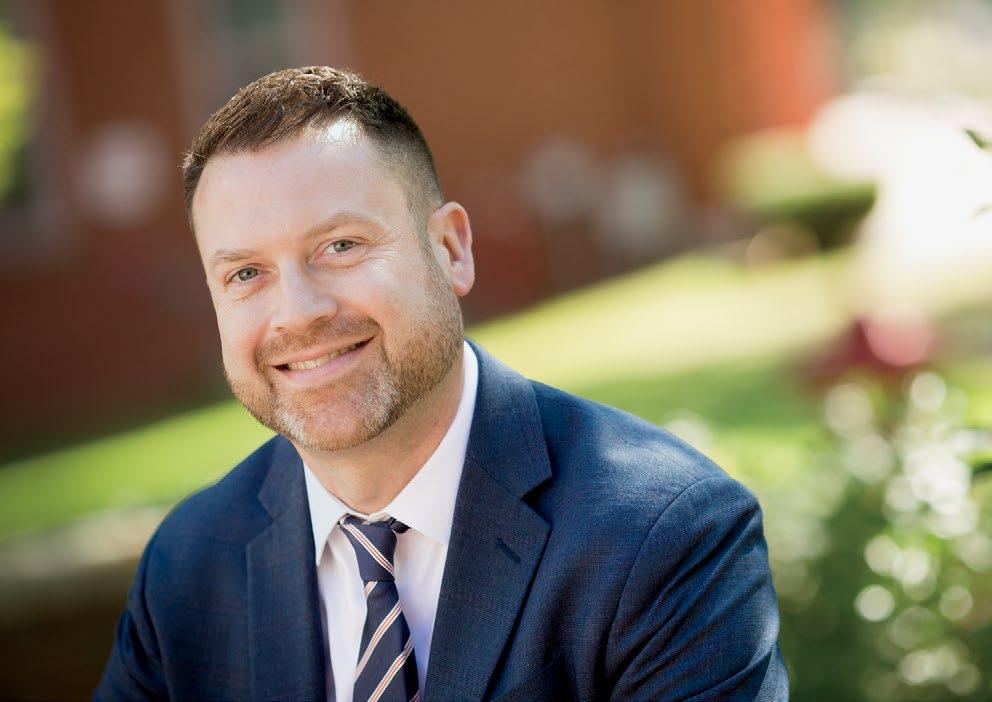
Electrical Engineering + Environmental Studies
In Introduction to Engineering: Renewable Energy , first-year students examine renewable energy technologies with a critical eye—and a steady hand. Projectbased labs give these engineers a greater sense of what it means to go off the grid. Students build small windmills to test their efficiency and even construct their own dye-sensitized solar panel with a surprising ingredient: raspberry jam! “It wasn’t a very effi cient solar panel,” Ansgar Jordan ’22 says in reflection of his undergraduate years at Tufts. “In fact, charging a phone with it would have taken many years. But the feeling of building something that worked was certainly very rewarding.” Ansgar continues to chase after that rewarding feeling in his current role at Tufts’ very own Data Intensive Studies Center (DISC).
Sitting at the intersection of food and environmental sustainability and alternatives to animal-based products is the work of professor David Kaplan on cellular agriculture—meat grown directly from animal cells. Members of the Kaplan Lab bring their expertise in tissue engineering to the table, experimenting with cows and caterpillars as sources of cells in generating cell-based meats set to mirror the taste and texture of everything from sausage to scallop, all while carrying the nutritional and environmental benefi ts of existing plant-based protein options. And with a $10 million grant for their ongoing cellulator agriculture work, don’t be surprised when you start to find their products lined up in your local grocery store!
An emphasis on “making” applies to engineers and artists alike. Floor van de Velde, a professor at the School of the Museum of Fine Arts (SMFA), teaches Digital Fabrication Lab, a studio sculpture course that allows SMFA and engineering students to develop proficiency in computer-aided design (CAD) and learn to safely and effectively use laser cutters, 3D printers, and CNC milling machines.
Through research, discussion, and practice, students are encouraged to develop a personal relationship with these technologies in order to integrate them into their artistic practices.
Computer Science + Aerospace Shoot for the stars—and you might land an internship at NASA. Last year, Elizabeth Hom ’22 worked as a software engineering intern at NASA’s Jet Propulsion Laboratory: “I’ve always been interested in aerospace, and it’s very cool to see how things I’ve learned in the classroom are applicable in industry work,” she explains. “Engineering is very much a team-based discipline, and despite the steep learning curve that comes with the first few weeks of most internships, it was really nice having so much support and vibrancy from the team I worked with.” And her internship helped lead to her current role post-graduation as an Associate Software Engineer at Disney Streaming.
Engineering + Education Through Tufts’ engineering education minor, students gain field experience working in the classroom and at the Center for Engineering Education and Outreach to inspire the next generation of engineers. “I used to always be torn between choosing to be an educator or an engineer,” says Madeline Fabela ’23. “One of the required classes for my minor was Society and Education, taught by professor Steven Cohen. This class really challenged my views and assumptions on education in America. It made me open my eyes to all the things that come into play when building and organizing schools.”
Through interdisciplinary courses in the engineering curriculum and eight courses they choose in the School of Arts and Sciences, Tufts engineers discover that engineering connects to far-flung fields—from studio art to sociology. Explore some of these intersections below.
Think you want to be a Tufts engineer? If so, we want to help you get there. Here are our top tips for applying to the School of Engineering from our very own Associate Director for Engineering Recruitment, Beky Stiles!

If the classes, research, and projects you read about here make you jump for joy: congratula tions—you’re an engineer! But if you’re on the fence between majors like biomedical engineering and biology or chemical engineering and chemistry, take a look at the online “degree sheet” for your intended major (Google “major + degree sheet + Tufts”). If the engineering major entices you more than the option you are considering in the School of Arts and Sciences: congratulations—you’re an engineer! Still unsure? Talk to current students, faculty, counselors, and family members. Then go with your gut and apply to whichever program feels like the best fit for you.
Our engineers typically take around 38 classes dur ing their undergraduate time at Tufts. And, as you hopefully can imagine, STEM courses logically make up a good amount of those 38! Our admissions com mittee does a deep dive into applicants’ math and science high school trajectory. Our most competitive applicants will be in the most advanced science and math courses their school offers. It’s okay and even encouraged to specialize a little bit your senior year. If you need to forego a fourth year of foreign language in order to double up in math or science, that’s a deci sion we understand and support as we review your transcript. But also embrace any electives that let you celebrate your inner engineer. Computer science, woodshop, orchestra…they all show an aptitude and mindset for engineering. Tufts celebrates that inter disciplinary mindset; after all, our engineers have to take eight courses in our School of Arts and Sciences as part of our curriculum.
Your school counselors and teachers are some of your biggest advocates in this process. Tufts requires one counselor recommendation and one teacher recommendation (but yes, you can send us more than one teacher recommendation!). For engineers, it is especially helpful to have a recommendation from a math or science teacher. Instead of asking a teacher who doesn’t know you well but who gave you an A++ on every assignment (because that teacher will inevitably talk about all of your A++s…which is already something we know from your transcript!), ask a teacher who truly knows you and can write sto ries and anecdotes to help us understand you better as a community member, collaborator, and tinkerer.

Tufts engineers aren’t just math and science whiz zes. They’re also playful, creative, collaborative, logical, enthusiastic, and grounded. In your essays, we’ll be looking for the soft skills that will make you a great engineer and the je ne sais quoi that will make you a great Jumbo. While you shouldn’t feel pressured to write about engineering specifically, do ask yourself if the topics you tackle showcase those attributes. And if writing isn’t your thing, don’t panic! Do the best you can with the task at hand, then feel free to show us your engineering skills through the optional Maker Portfolio.
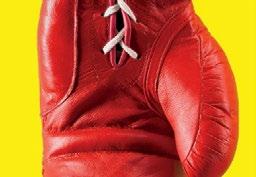


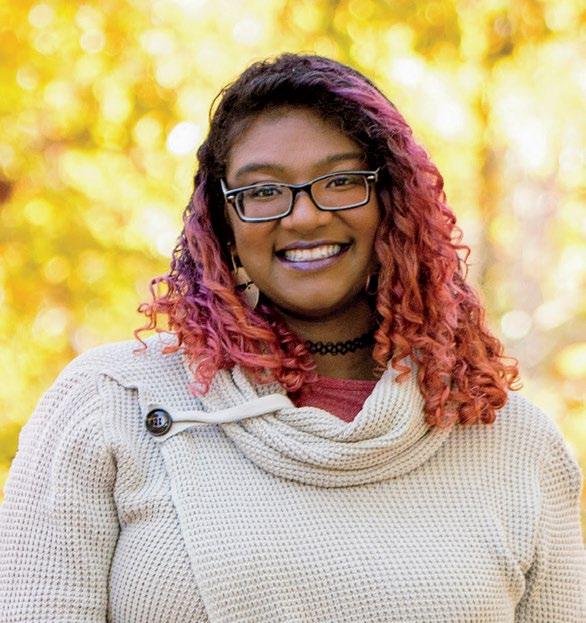
THE CENTER FOR STEM DIVERSITY (CSD) is excited to announce that Dr. Grace Caldara will be the new Director starting in the fall of 2022. Dr. Caldara brings her passion for STEM and mentorship to the CSD, a supportive and welcoming space for students who have been historically excluded from STEM fields. Before Tufts, Dr. Caldara taught biochemistry labs at Chapman University and worked in the nonprofit sector as a mentor and advocate for diversity, equity, and inclusion across STEM fields.

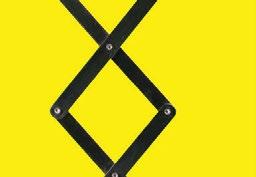

THIS ANNUAL EVENT is making a comeback this fall! Created to provide fi rst-year engineering students with a “one-afternoon” experience, students will form teams to participate in a collaborative design challenge. Hosted within the first few weeks of classes at the Science and Engineering Complex, undergraduate teams work to create sections of a Rube Goldberg machine with the goal to have a start-to-finish system completed in just four hours. No preparation needed, just show up ready to rumble!
STARS ARE MORE than just flaming balls of helium and hydrogen thousands of light years away from our planet. They’re also the basis for many stories, myths, and art for cultures around the world and throughout history. Considering those varied understandings of stars from many different cultures will shed a light (get it?) on new ways of interpreting something in our universe that we often take for granted.

WHO SAYS engineers can’t study abroad? Thanks to the ten Tufts programs abroad and over 150 pre-approved programs available to Tufts students, the world is at our students’ fingertips, regardless of major. With multiple engineeringspecific programs like the summer program focusing on data and computer science and Italian in Pavia, Italy, or the semester-long opportunities through Tufts-in-Chile or Tufts-in-Hong Kong allowing you to combine your (presumably many or varied!) interests, there are many ways to get involved and get abroad.
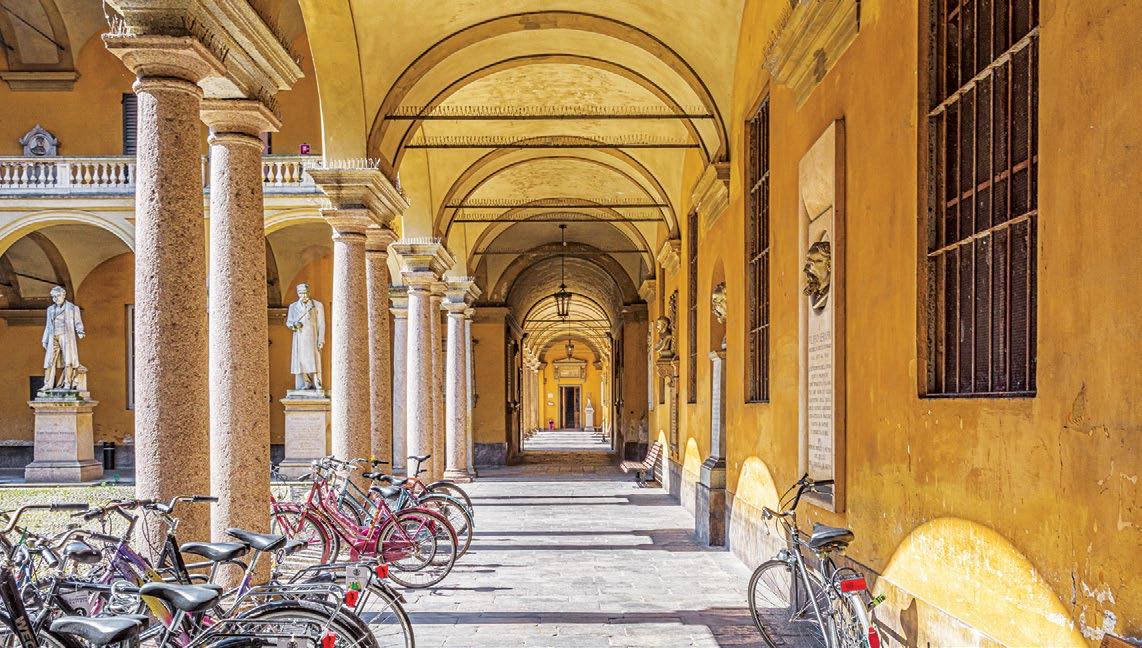














REDEFINING THE IMAGE OF SCIENCE AND ENGINEERING (RISE), one of the many incredible programs within the Center for STEM Diversity, is designed to provide support to historically excluded students in STEM and engineering. First-year scholars in the program receive advising and mentorship through weekly seminars focused on guidance during the transition to college, introductions to faculty, lab tours, socials, networking opportunities, and more. The close-knit community also leads to friendships that extend well beyond graduation.







TUFTS’ NEWEST academic building, which opened in 2021, is a multidisciplinary space designed to bolster the flow of both people and ideas. The Joyce Cummings Center will serve as the new home for the Data Intensive Studies Center, the Departments of Computer Science, Economics, and Math, and the Tufts Gordon Institute. The new Green Line station, which is nearing completion, will make Boston more accessible and increase access for engineering students traveling into the city for internship opportunities and outings.
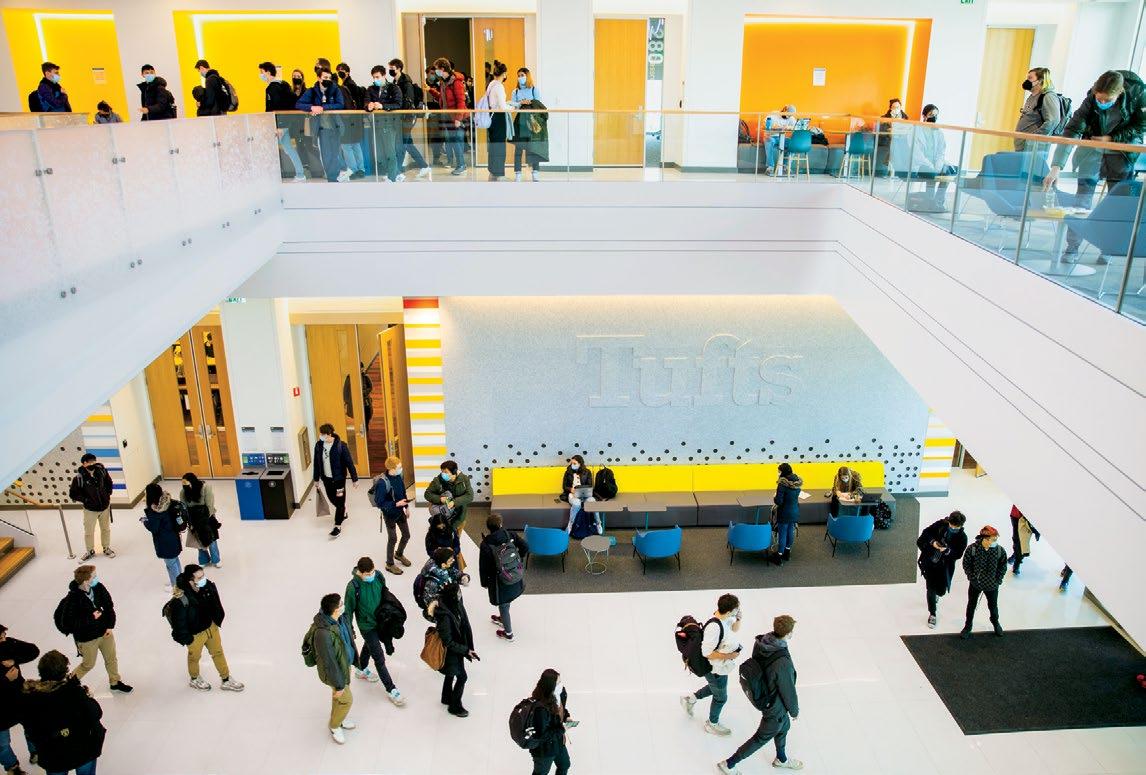
The first thing I noticed about Teo during our Zoom interview was their massive collection of plants. “I love doing work under a tree,” they laughed in explanation. The second thing I noticed was their passion and drive for everything they set their mind to. Whether it was setting up special shelving and purple lights to support their many plants (including the four avocado trees behind their desk), taking on a wide variety of internships to get a broad depth of experience, or triple majoring because they were only “three classes away anyway,” Teo is a shining example of the passion and drive that Tufts stu dents bring to life on the Hill.
Teo first found out about Tufts through a visit to the Boston area during their sophomore year of high school. “Tufts ended up on my list because I knew it had engineering and also because it is a QuestBridge school and provides full financial aid. And then I went to the fly-in for prospective engi neers. And then I applied Early Decision because of course!” Tufts’ fly-in program, called the Voices of Tufts Diversity Experience, is not just for students interested in engineering—it’s an incredible experi ence for all attendees. “It was the first time I was around such a diverse group of high school stu dents. I think my high school was very diverse, but
in a way that we all had similar experiences. It was really cool to see people of different backgrounds just checking out Tufts, it was really cool.”
They also found a passion for engineering in high school. “I went to an engineering high school, so we had basic mechanical and a couple of electri cal engineering (EE) classes. I gravitated towards the electrical ones because they were challenging but also super engaging. I idealized the computer science (CS) track too, so when I came to Tufts I went super hard, super early on CS and then fol lowed the regular EE track. Then I realized I was only one class away from a minor and three classes away from a [math] major!” As for finding a way to combine their interests in multiple fields, Teo has had no problem with that. “I love the combination of hardware and software. Taking math and using it in a way that you can prove this hardware/soft ware configuration is mathematically sound is really, really cool for me.” One particular way of combin ing these interests is through cybersecurity. Teo’s experiences at various internships, jobs, and lab research throughout their undergraduate career has given them experience with topics as varied and complex as hardware security and embedded side channel analysis focused on reading EM waves off
of chips to break encryption algorithms, to sup porting other students in the Nolop makerspace on campus. All Tufts students can make use of Nolop, located in the Science and Engineering Complex, and staff like Teo love the work because of how wel coming and encouraging the space is. “I absolutely love it because it’s such a great community. I think right now I’m the only Asian and queer person on staff, and it’s great because I really feel like I get to represent people and support them with [their proj ects].” As for research, they are most involved with Professor Marco Donato’s Tufts Emerging Circuits and Systems (TECS) Lab and are in the planning stages for their senior thesis this fall. “It’s prob ably going to be about security. My directed study (independent research) was on comparing matrix compression algorithms and seeing how hardware accelerator versus software implementations were different.”
As we finished our interview, I asked Teo what their main advice for applicants to Tufts was. It came in three parts: “Know what you can handle. But always challenge yourself. Know yourself and challenge yourself appropriately!” We can’t think of a more Tuftsy way of putting it.
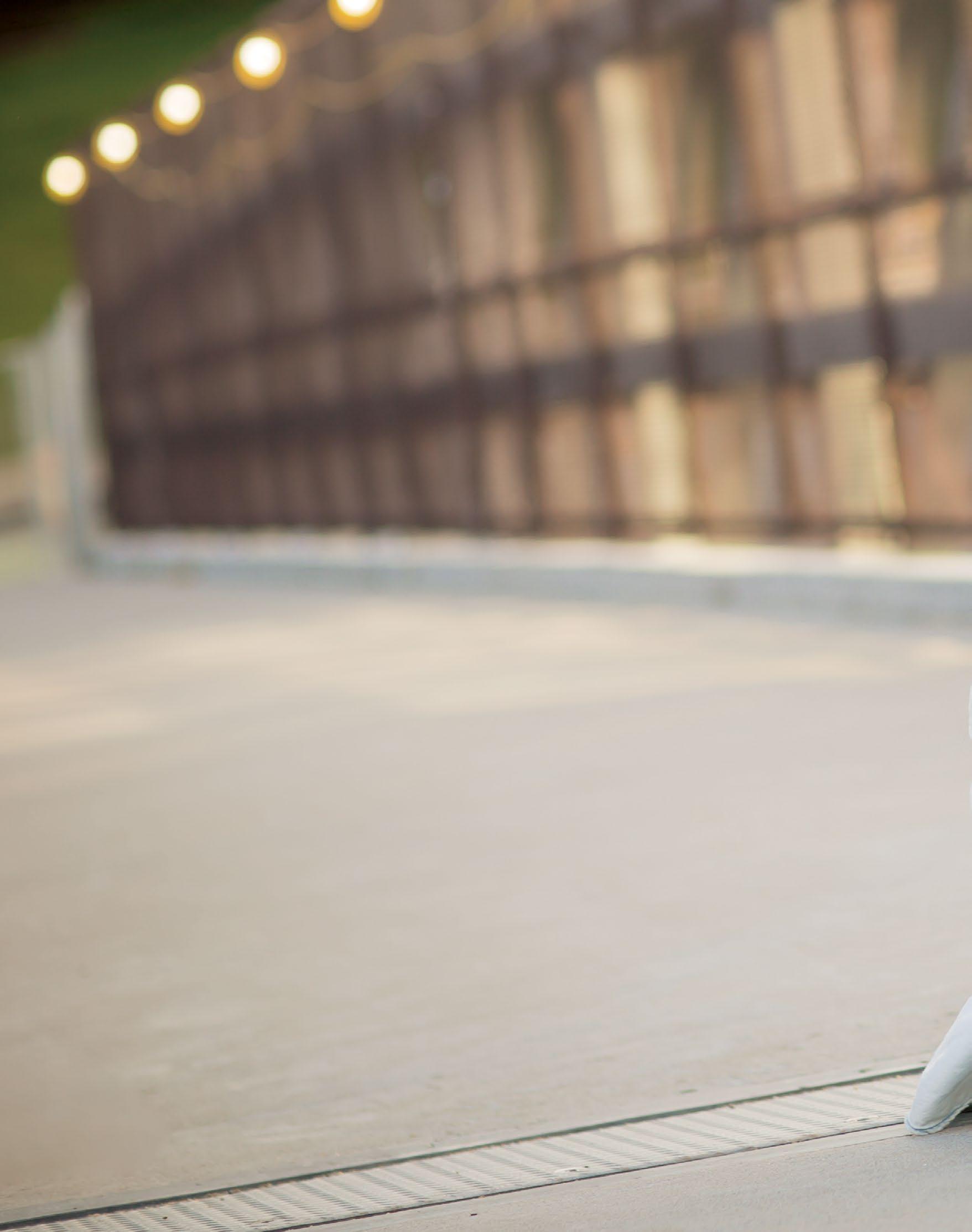
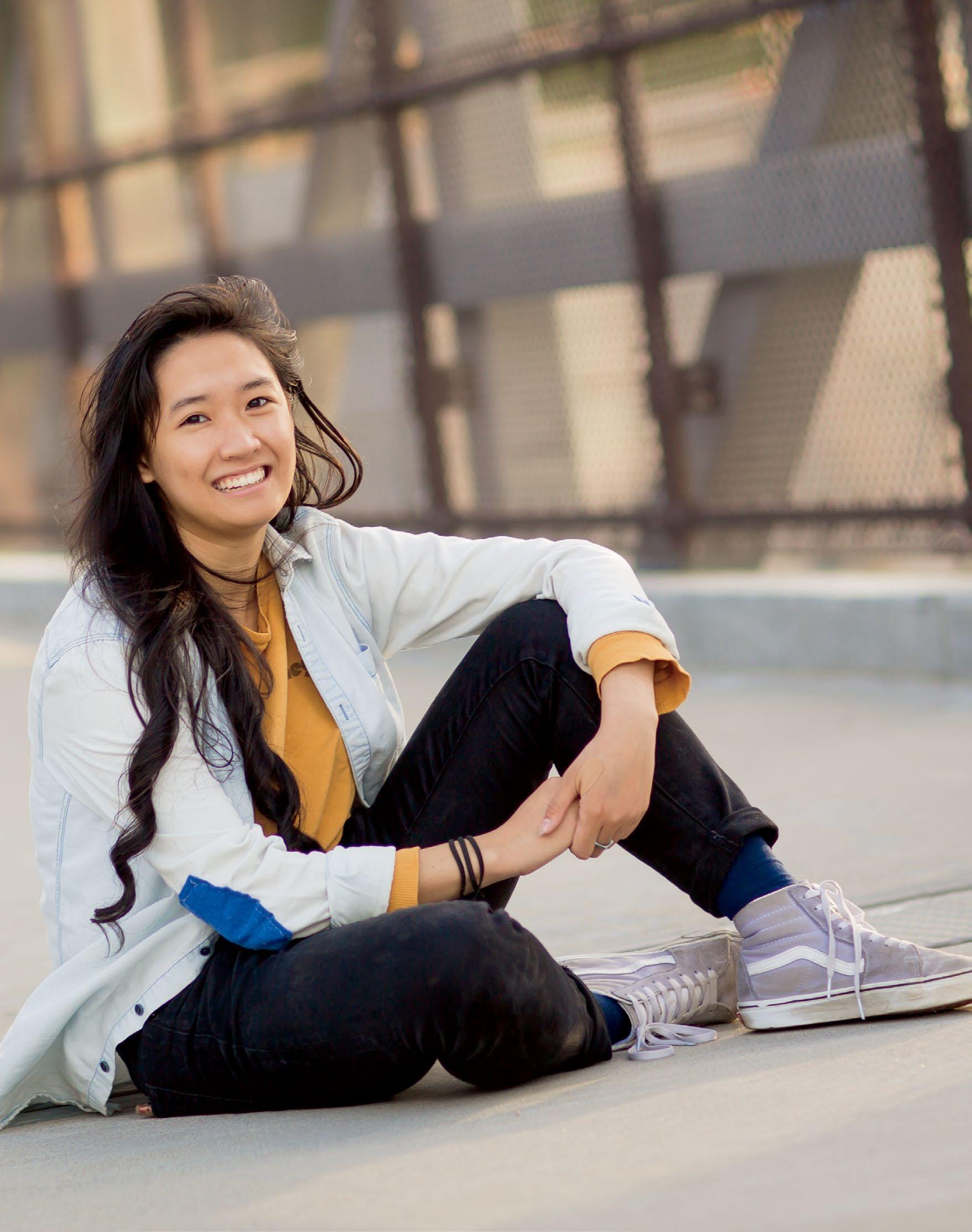
“Know what you can handle. But always challenge yourself. Know yourself and challenge yourself appropriately!”
10:30
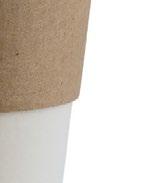




ES-2 Introduction to Computing: Professor Cross in the Science and Engineering Complex Anderson Wing
11:43 AM
Join my two friends Gaby & Tara on our short walk between classes
12:00 PM
PHY-11 General Physics 1: Professor Gallagher
1:30
9:04 AM
*Cue iPhone Alarm Radar Sound*... Snooze Count: 2
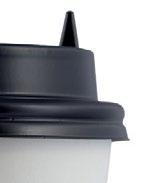
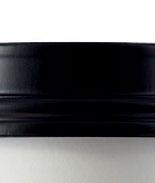


9:23 AM
Time to get up—accept the fact that I will never be a morning person
9:45 AM
Pick up my usual breakfast order from Hodgdon Food-on-the-Run: coffee w/ cream and sugar + Medford bagel (cream cheese, onion, dill & cucumber on a plain bagel)

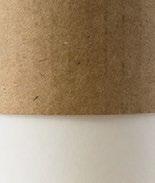
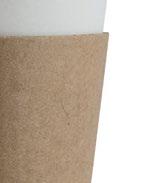
PSY-13 Social Psychology: Professor Remedios begins. We learn about famous social psychology research studies and how they relate to our real life—everything from love and attraction to prejudice and stereotypes
3:00




MATH-34 Calculus 2 recitation
3:50
Now the fun part begins! This semester, I’m working in Professor Kaplan’s Biomedical Engineering Lab with the cellular agriculture team, researching projects regarding culturing cells and growing meat in the lab
5:30 PM
Walk back to Harleston Hall to begin some homework so I can have most of my weekend free to hang out with my friends or explore Boston
7:00 PM
Dinner at Carmichael Dining Hall with some friends from my Harleston Hall floor














9:00 AM
Go to the Fitness Center and lift!
10:30 AM
BIO-130 Animal Behavior: Professor Starks
12:00 PM
Stop by the Nolop makerspace to laser cut or engrave a new project—maybe an engraved charcuterie board?
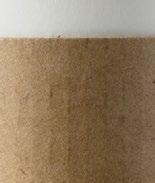
1:30 PM
ME-40 Engineering Design 1: Professors Hannon, Liesk, & Chiesa
8:15 PM
Club volleyball practice in Chase Gym

11:00 PM
FaceTime my family and friends from back home, then call it a day!
3:00 PM
CSHD-125 American Sign Language 2: Professor Applegate
No day is alike for any two Tufts engineers—so we asked three Tufts engineers to share a day in the life, complete with classes, snacks, and shenanigans.
8:00 AM
Shower, and get breakfast from Dewick (if I actually woke up on time) or Kindlevan (if I’m running late)
The real work begins! This evening time is usually devoted to partnered homework assignments, as this is when most people are available to work
4:30 PM
ENP-161 Human Factors Production Design: Professor Intriligator
7:30 PM
Volunteer with Tufts Food Rescue Collaborative (I worked a shift once a week packing excess dining center food—now I’m a coordinator!)

8:30 PM
Work a shift at Ginn Library (I’m a circulation worker at the front desk)





















6:00 PM
Study (or nap) at the Women’s Center
7:00

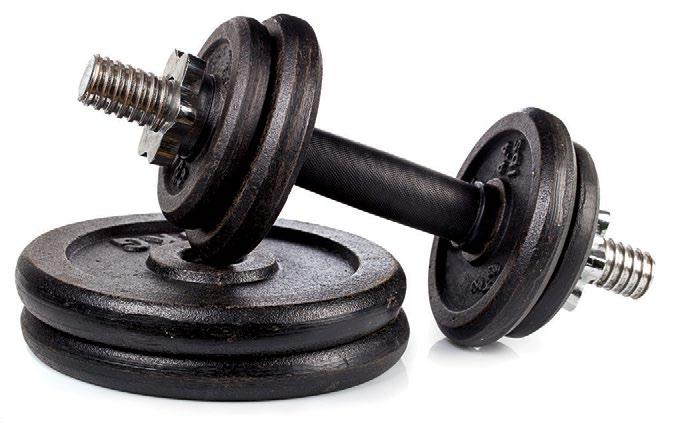
Stop by Dewick for dinner with friends




11:00 AM
Either host office hours, or run a lab for CS-11, the introductory computer science class

1:30 PM
CS-21 Concurrent Programming: Professor Sheldon








I almost always grab dinner with whoever I’m working with at some point before 9. The default choice is Dewick, but if we feel like switching it up, we can go to Carm. Or, if we’ve had a particularly successful day or are planning on working late into the night, we might indulge ourselves and order out from Dumpling Kitchen or a Pho place
3:00 PM
Look over/rehearse music for MUS-81: Concert Choir, the auditioned curricular choir at Tufts


4:30 PM
CS-116 Intro to Cybersecurity: Professor Chow
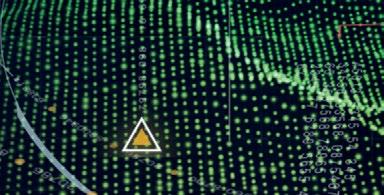

Engineers have a multitude of courses to choose from, but there are a few specific classes or requirements that every Jumbo engineer must complete to graduate. These are great opportunities not just for expanding your understanding of real world applications for engineering, but also places where you can build community and relationships with like-minded Jumbos.
EN -1 Introduction to Engineering































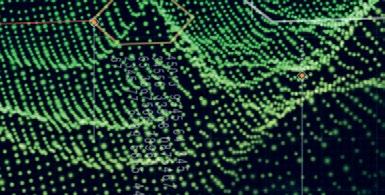


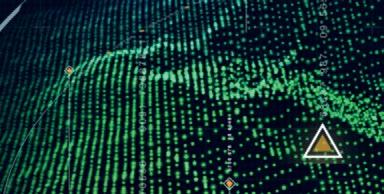















Every engineer at Tufts is required to take an EN-1 course during their first semester at Tufts. These courses focus on project work, engineering ethics, and the engineering design process, with all options customized to students’ personal interests. Not to mention, the course topics are just fun—Remote Exploration with Roomba, anyone? Through their many projects, these courses provide students with a hands-on introduction to various aspects of engineering and the tools to apply their learning to real-world issues. Tackling real-world problems encourages students to think outside the box, and Tufts engineers engage in this kind of learning from day one. And our Introduction to Engineering courses are anything but surface-level—they allow for and encourage innovative thinking, collaboration, and real impact. While always challenging, the School of Engineering is not a hyper-competitive space. Engineers at Tufts readily work with one another to learn new concepts and ideas and then put them into practice. Collaborative courses like Introduction to Engineering provide the foundation for such an environment, where the only competition is with yourself to grow as an engineer and a person. EN-1 course options for the Fall 2022 semester include Sci-Fi Bioengineering, Bridges for Resilient Cities, and Impact of Self-Driving Cars
ES-2 Introduction to Computing for Engineering Though all engineers at Tufts are required to take EN -1, ES -2 is a little more unique. Depending on their major, students have the option to take either this course or Introduction to Computer Science to fulfill the requirement. Introduction to Computing for Engineering is always offered in the spring semester and is designed to provide an introduction to engineering problemsolving with the aid of computation software. Students will gain fluency in a computer language, understand how to use tools designed specifically for engineering computing, and apply those tools to analyze data. Most engineers will take an ES-2 section that focuses on Python, but MATLAB is an option too!
Tufts engineers end their undergraduate career in the same way in which they began: through collaborative, hands-on, project-based work providing practical solutions to complex problems through their senior capstone projects. The senior capstone will test your engineering skills and will also grant you the opportunity to dive deep into an area of engineering alongside an interdisciplinary team of fellow Jumbos. With opportunities to be both playful and practical, the engineering senior capstone projects are a culminating experience for our undergraduates, showcasing their creativity, curiosity, and collaborative know-how. For many seniors, the fall semester is spent gathering data and creating a proof of concept so that the spring semester can be spent developing, implementing, and testing the project before the end of year showcase. Previous examples of projects include “Hazard Detection & Positioning System for Asteroid Navigation” and “Personal Plasma Water Filtration.” The possibilities are endless!
Women in Computer Science (WiCS)
Established in 2005, WiCS has a long history of creating intentional space for women and nonbinary individuals in Tufts’ computer science programs. Its annual Women in Tech Conference, hosted on Tufts’ Medford/Somerville campus each fall, is open to anyone from high school students to industry professionals to share their passion for computer science, celebrate their achievements, and network. Through a multitude of other events geared towards building community (like the Sushi Social) and professional development (like the Lunch and Learn series), WiCS continues to support its members through every step of their Tufts journey.
National Society of Black Engineers (NSBE)
The National Society of Black Engineers is one of the largest student-run organizations in the country, with chapters in high schools and institutions of higher education alike. With a dedication to instilling a love of engineering and STEM both at Tufts and in our host communities of Medford and Somerville, Tufts’ NSBE chapter hosts conferences, alumni and career panels, and social gatherings throughout the year. NSBE also encourages academic and professional success through active mentorship and networking opportunities, creating a powerful and supportive group as undergraduate members navigate the transition to graduate programs and industry. Ever dedicated to the community, you can find NSBE members teaching fun STEM projects to kids during Tufts Community Day or relaxing together during finals with a Brain Break.
Society of Women Engineers (SWE)
Open to all female-identifying engineers at Tufts, SWE was founded to create a community for women in engineering disciplines to find support and guidance throughout their academic and professional careers. With social, professional, and community events, SWE actively connects women in industry, college students, and young girls just starting their adventures in engineering. Be on the lookout for the biannual “SWEets with SWE” event, the very popular meet-and-greet for students interested in joining. And with yearly national conferences to attend, fun outreach events with elementary, middle, and high school students, and an incredibly supportive community right here on campus, there’s no better time to join than now!
Society of Latinx Engineers and Scientists (SOLES)
Founded over a decade ago, SOLES is a tight-knit community of Latinx engineers at Tufts. Giving back to the community is integral to SOLES. SOLES members often travel to local elementary and middle schools to share their passions for STEM! And community is built right here on campus too. With networking events, resume workshops, and career center nights, SOLES supports its members in their professional development and growth. There’s always room for game nights and escape room trips too, which help the group feel like a home away from home for many of its members.
An outreach program run through our Center for STEM Diversity, the STEM Ambassadors are a group of Jumbos interested in bringing STEM programs to local middle and high school students. Any student can apply to join the team, but most share a passion for education, the STEM disciplines, and supporting local communities. STEM brings them together, but a drive to share their passions with historically excluded students from the STEM fields in our local communities sets the STEM Ambassadors apart.
Affinity groups provide spaces for comfort, belonging, and mentorship. Tufts’ School of Engineering has a number in place specifically for engineers to both build community and work alongside passionate peers. Explore a handful of these groups below.
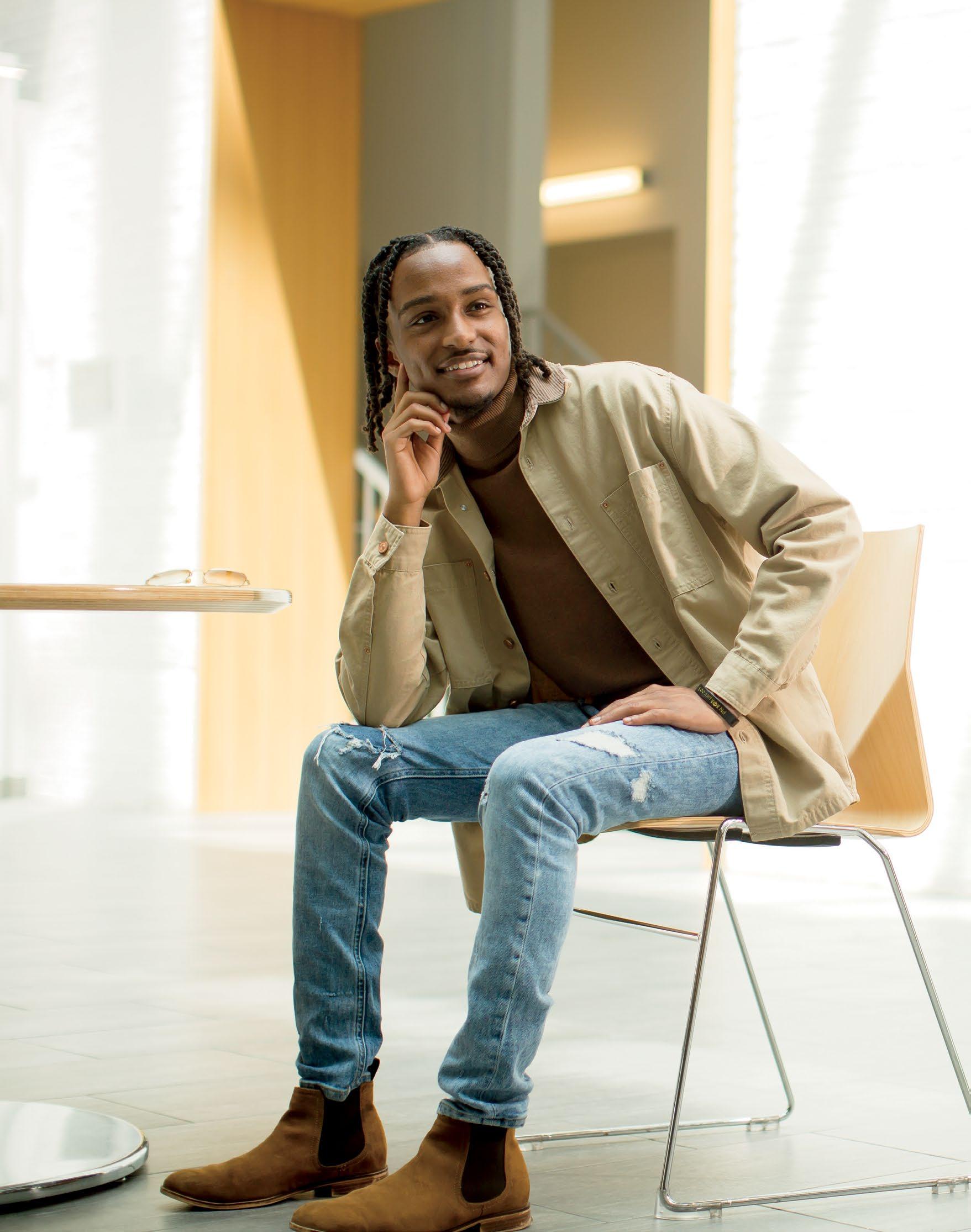
“The breadth of knowledge I’ve gotten from the engineering track helped me get a better understanding of how everything connects in engineering.”
I caught up with Najib as he was preparing for his study abroad trip this past summer, something he had been looking forward to for a long time. “Since my first year I knew that I wanted to travel and get a more global perspective. [The program that stood out to me] was the data science and data analysis study abroad program in Pavia, Italy,” Najib said. As a computer science (CS) major in the School of Engineering, this summer program was right up his alley. “With the engineering track, [study ing abroad] can be difficult to plan, but since this program is during the summer, it was very in line with my schedule.”
Even with that busy schedule, Najib has found ways to stay active and involved in Tufts through his residence hall and student organizations. “I lived in Metcalf Hall [my first year], which is near the center of campus. It’s kind of like an H shape and it’s split into bubbles, which led to a really strong relationship with my bubble-mates. Every time I would come back, if I wanted to eat, hang out, talk through something, there would always be someone who was up. To this day we all keep in touch, even though we’re living in different places.” Community came from beyond his residence hall, too. “There was a pre-orientation event where a dance group called the BlackOut Step Team performed. And I just remember being so blown away. I tried out and made the team, which ended up being one of my closest communities my first year.”
Community service also plays a major role in Najib’s time at Tufts. Whether on-campus or in the Medford/Somerville area, giving back is core to his college experience. One of the first ways he did so was through the National Society of Black Engineers, or NSBE. “I was president of my high school chapter, and I remember when applying to Tufts, I wanted to see if it had a NSBE chapter as well, which Tufts does. I was very excited by that because NSBE has had one of the largest impacts on me as far as my interest in engineering and supporting me career-wise. Last year I was vice president, and this year I served as president of the chapter.” Even with those responsibilities, Najib found more ways to be involved. “Another big thing that I do is my involvement with my fraternity, the
Rho Nu Chapter of Alpha Phi Alpha Fraternity, Inc.
And I would honestly say that joining is probably one of the best decisions I’ve made during my time here at Tufts. It’s centered around service and uplifting the community which are some of the values that are strongest for me.”
Najib is just as driven in the classroom as he is outside of it, which is one of the reasons he was drawn to Tufts’ engineering program. “The aca demic track was rigorous, prestigious, and it was in line with what I was looking for. I was always the kid that would tear open gadgets and break them apart, tinkering around with different elec tronics. When it came to choosing between the School of Engineering versus [the School of] Arts and Sciences, I was most interested in honing my technical background and those surrounding skills.”
With his plans to work in the tech startup world of Boston, it was the perfect fit. “When I came to Tufts, I got a better understanding of the foundation of computer science that also tied in with electronics, with physics, all those different things. I think the breadth of knowledge I’ve gotten from the engineer ing track helped me get a better understanding of how everything connects in engineering, which is pretty fascinating. It’s a good understanding to have as you’re going into industry. Last semester I heard that there’s this program called Jumbo Ventures. You sign up and, if you’re accepted to the cohort, they essentially help you start a business. They have weekly meetings where they bring in different guest speakers like CEOs and entrepreneurs. They provide resources and, at the end of it, you’re able to compete to win a cash prize. That was something that I learned about, and I was like, wow, this is exactly the opportunity I was looking for. Now I actu ally have a fully fleshed out business model, and I’m working on creating the prototype application. This is just one of the opportunities at Tufts that was so in line with my interests and something I was thankfully able to extract a lot out of.”
As for plans for senior year, Najib has one goal: “making the most out of every single experience and just being present.” Sounds like the perfect send-off to an incredible and impactful undergradu ate experience.
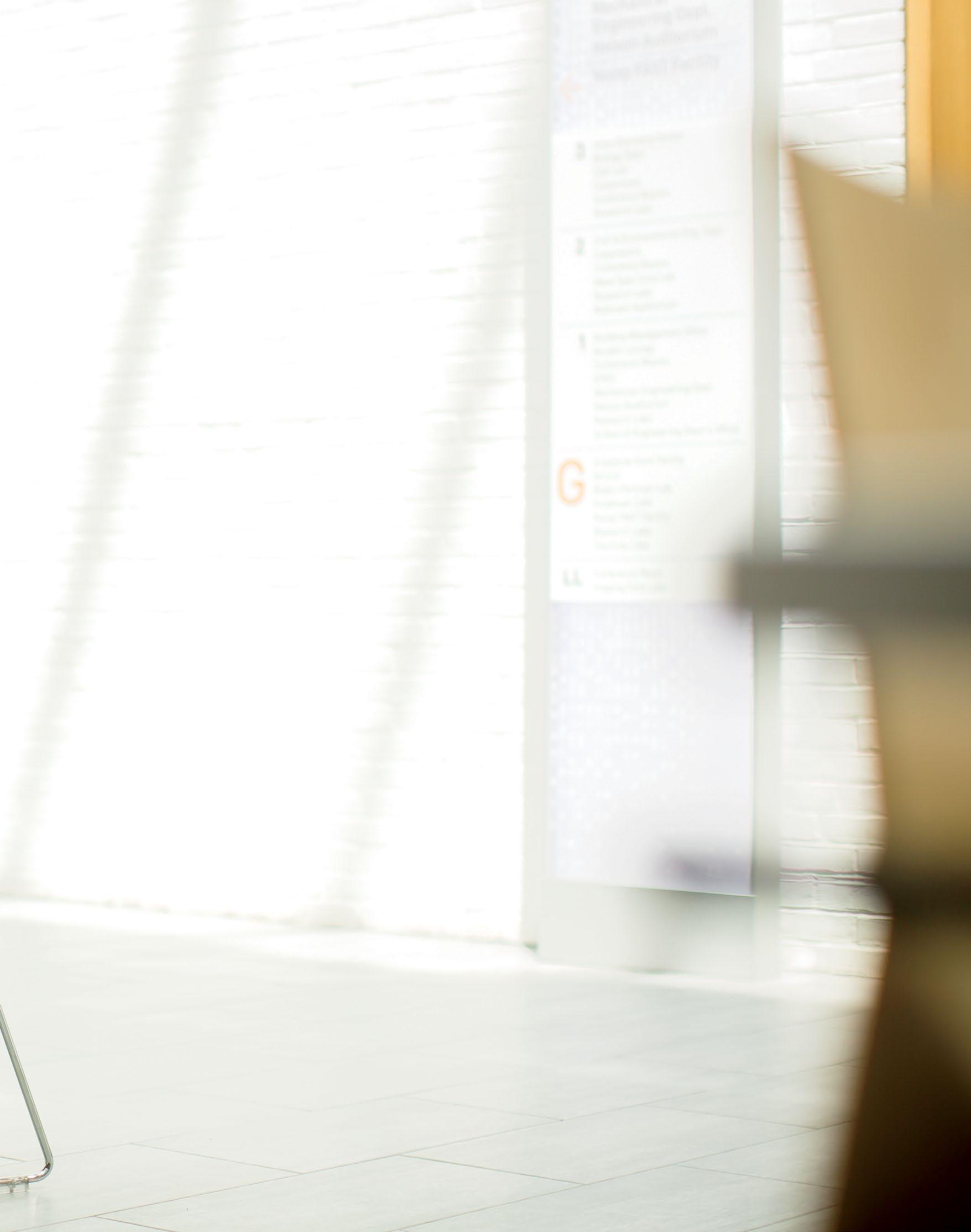

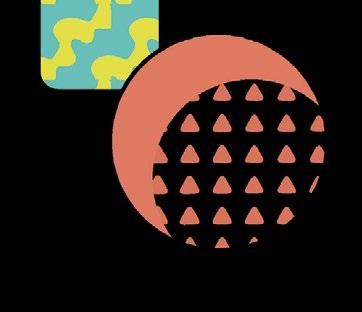
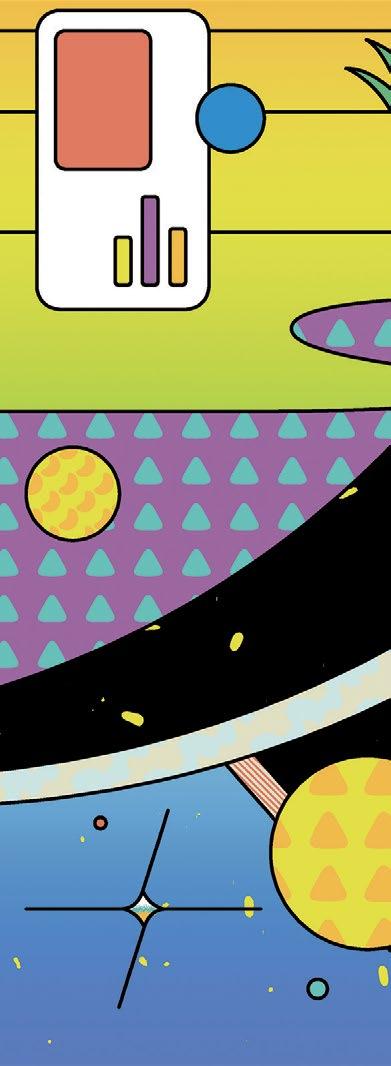
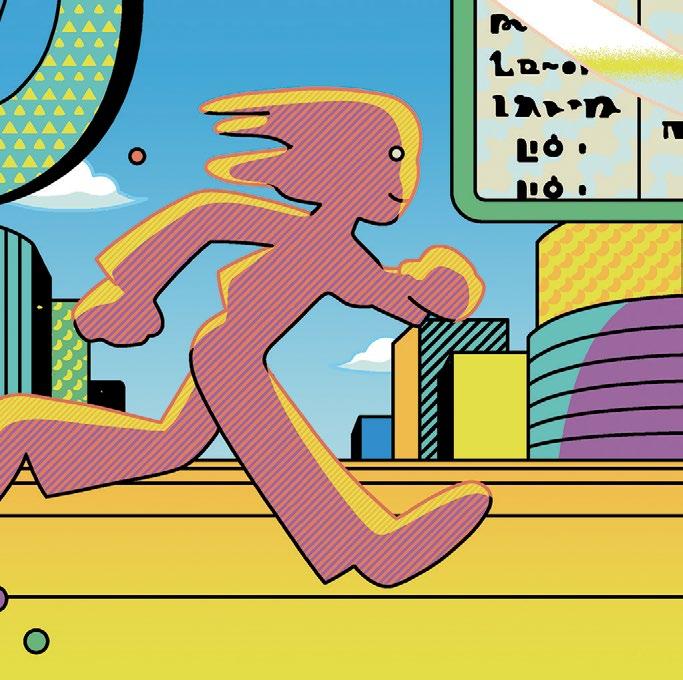
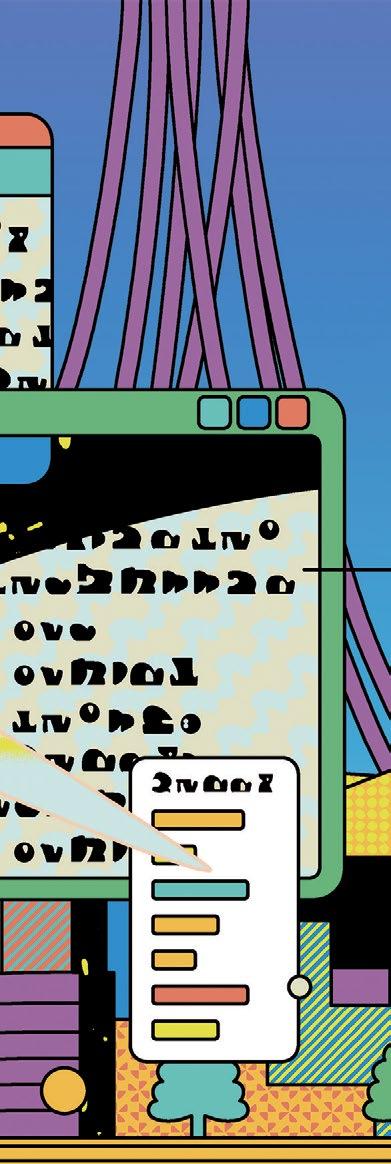
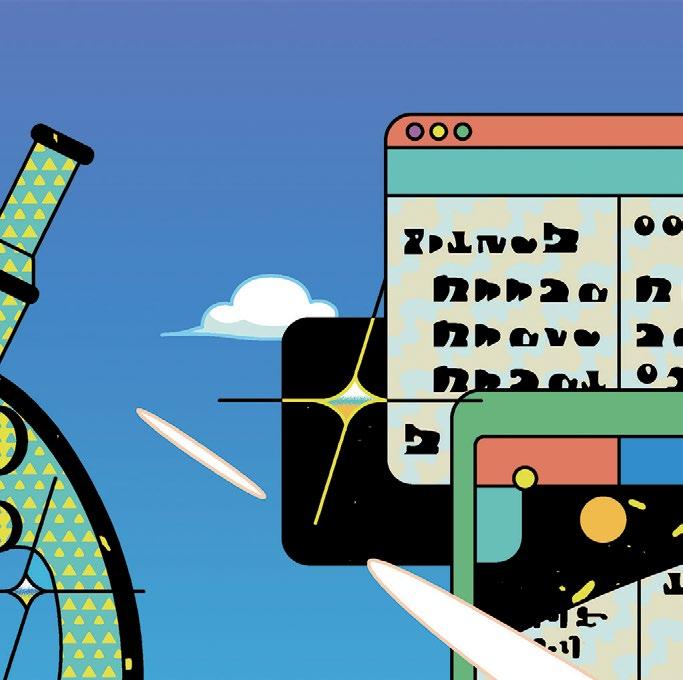
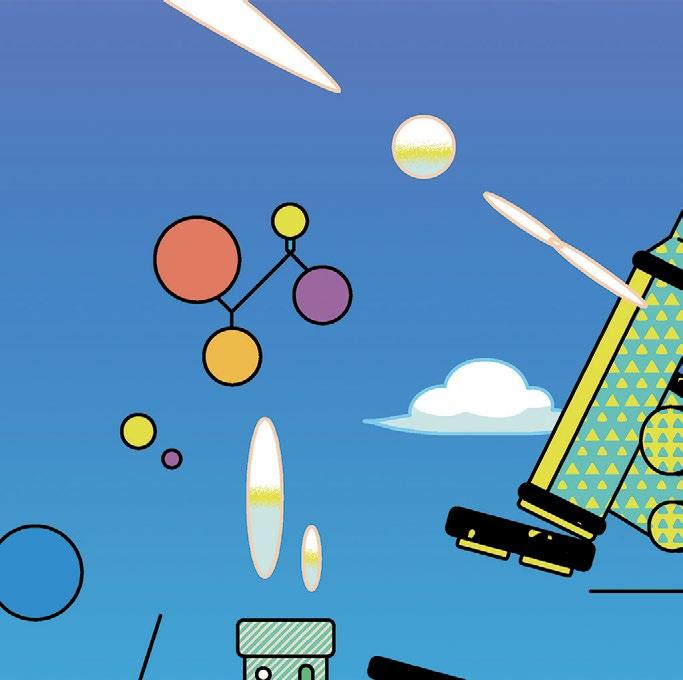

Watt is engineering, you ask? Great question—we once had the same one! People may see engineering as a monolithic discipline, restricted to building and tinkering. It’s us, we are “people.” However, after sitting down and talking to some engineers, we realized there is no one way to be an engineer. Read these profiles and you’ll see what we mean. With the help of fellow students, we’ve gotten the inside scoop on the most popular engineering majors that Tufts offers. So, without further ado, let’s dive in!
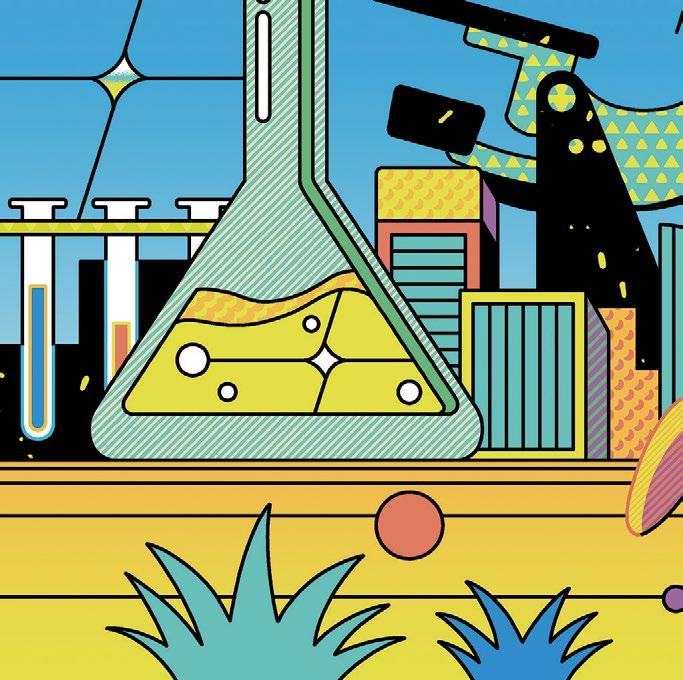
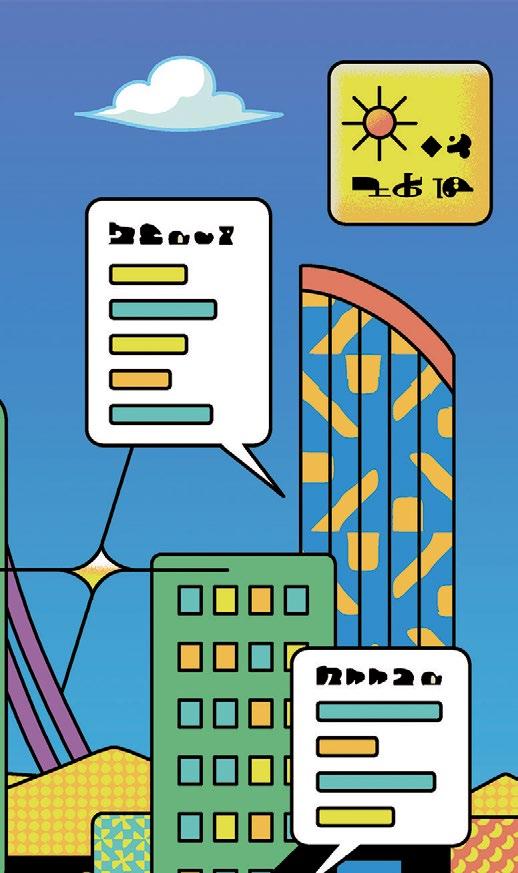
INTERVIEWEE: Michelle Sun ’24 from Taipei, Taiwan
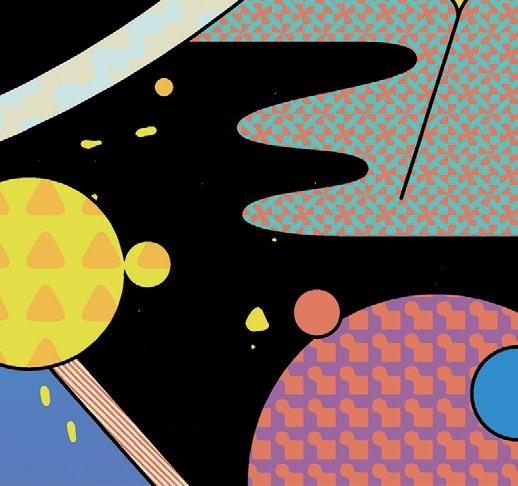
Do you find yourself saying “it’s a great day to save lives” wholeheartedly? Do you love biology and technology? Do you enjoy having a polysyllabic major that makes people go “OOOooohhh!” all the time? Is your heart in the lab (literally)? If you answered yes to any (or all) of these questions, then a degree in biomedical engineering might be the perfect fit for you! Biomedical engineers work to improve the quality of human and animal life by studying how doctors and patients interact with medical equipment. This allows them to improve devices, drugs, and other therapeutic treatments, paving the way for future innovations in the medical field. Their work includes everything from imaging technologies to prosthetics to biocompatible drug delivery systems.
At Tufts, the BME major is divided into three focus areas: regenerative medicine, drug delivery, and biomedical devices. Projects range from silk-based nanocircuitry to lab-grown hearts to dissolvable bioelectronic devices, with endless possibilities in between. According to Michelle, “I’ve always been fascinated by creations that seem impossible, and [BME] checks off all the boxes. My favorite part is tissue engineering; creating something from tiny stem cells to a fully functioning organ that could help someone is insanely interesting. I love that there is still so much to explore, and Tufts has defi nitely given me the knowledge, confi dence, and resources to contribute to this field!” These impressive BME projects are all possible thanks to a committed student body interested in medicine and biology and professors who are more than willing to support these passions. Furthermore, through Tufts’ co-op program, students gain valuable hands-on experience in many different BME subfields and combine problem-solving and innovative thinking with technical knowledge. So, whether you find yourself in a lab with other students or in a lecture taking notes, you’ll be ready to change the world as a Tufts BME!
Do you find tiny things cute? Chemical engineering may be right up your alley, considering how small molecules are! Chemical engineering seems easy to understand at first. After all, it’s simply chemistry plus engineering, right? Add a little bit of this, a little bit of that, cook at 365 degrees, and voilà! However, the field is much more complicated than you think. Derin chose to study ChemE—hear what he has to say. “What I love about chemical engineering is how broad of a discipline it is, and how far it reaches into different areas of technology. The unique skill set of designing processes from the lab to full-scale production allows for chemical engineers to tackle real world problems from energy to medicine. Tufts has given me the resources into this field to see
the unlimited possibilities to make an impact on the quality of lives. Perhaps daunting but super exciting!” Chemical engineers design almost all the equipment and processes used in manufacturing plants. They also develop chemical controls and specialty materials. In other words, there is a wide range of industries chemical engineers can enter, including pharmaceuticals, technology, and pollution remediation. At Tufts, students have designed biopharmaceuticals, consumer products, fuel cells, and more in their classes and labs. Others have pursued internships to learn about waste management and find new ways to deal with environmental crises (e.g. plastic waste). Some have explored nuclear physics and kinetics in order to design reactors. Our curriculum prepares students to think on the industrial scale, where factors like heat management, fluid transport, mass transport, and process control come into play. Chemical engineering is definitely an explosive, exciting field to explore if the intricacies of chemistry captures your attention. There will never be a dull moment!
CIVIL ENGINEERING (CIVE)
INTERVIEWEE: Clarissa Garzon ’24 from Boston, MA
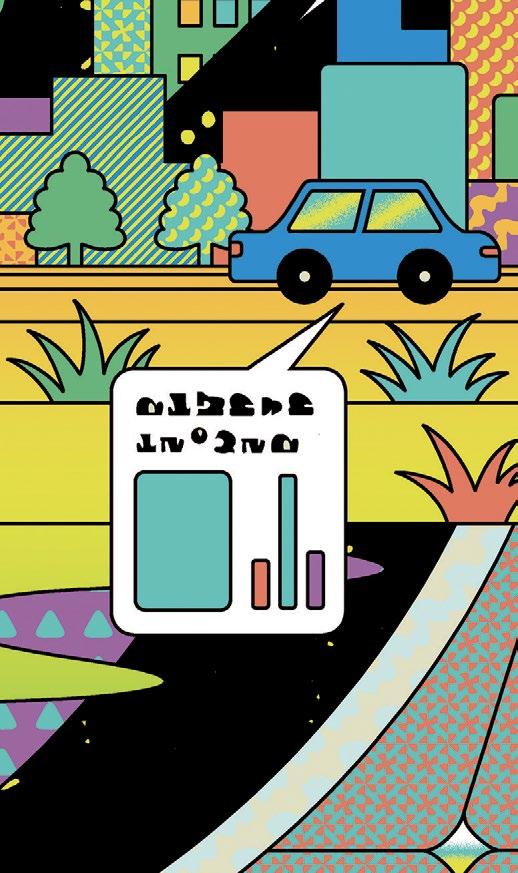
Do you catch yourself admiring architecture? Were Legos your favorite childhood toy? Perhaps you should consider a future in civil engineering! From highways, buildings, bridges, and airports to irrigation systems, civil engineers have built the modern environments we live in. The discipline includes fields such as structural engineering, transportation engineering, and geotechnical engineering, and environmental fields such as irrigation engineering, wind energy engineering, soil engineering, and ocean engineering. At Tufts, students can focus on the technical side of construction by studying how buildings are built and how they interact with society. Clarissa explains this unique major well: “One thing I enjoy about my major is how small of a group we are! That leads into another reason why I love my major: the collaborative nature of being a civil engineering student. The issues that we are preparing to solve involve working with many stakeholders and many other engineers and professionals. Lastly, and more personally, the reason I choose to be a civil engineering major is the hope that I can work on infrastructure that prioritizes communities and impacts on those communities, which are lessons that I have taken away from my classes.” You might also study the science of soil behavior, create biodegradable concrete, or design LEED-certified buildings for the Tufts campus. Best of all, Boston is a city with unique engineering challenges, so students can study structures and environmental impacts in their backyard! Regardless of the path you choose, all CivEs will learn surveying techniques and develop a thorough understanding of construction materials, soil reactivity, and hydraulics. Your path to getting started can be as easy as taking the Introduction to Engineering class, Bridges for Resilient Cities
BY JINHWA JANGINTERVIEWEE: Ellis Brown ’23 from West Hartford, CT
And here comes the major everyone knows...or do you really? Computer science engineering is fre quently mistaken for computer engineering and vice versa. In these two sections, let’s clear up some misconceptions. First, CSE students focus primar ily on the software side of computers. They work on algorithms for computer programs and digital tools. They also maintain operating systems and databases. As Ellis describes it, computer science is “problem solving with programming as your main tool.” Second, CSE students do not just program all day long. There are some branches in CSE that require more logic and problem-solving skills than coding. You do not have to be an expert in Java, SQL, C++, or Python to be a data analyst, a software tester, or a search engine optimization specialist. And if you develop excellent habits in commenting and enjoy writing, you could become a technical writer! So, don’t get scared away by the program ming or math. As one of the most popular majors at Tufts and a quickly growing field, CSE opportunities are endless! There are numerous clubs and events (i.e. Tufts Polyhack, Women in Computer Science, JumboCode) that bring the CSE community together to solve problems, create apps, and gain experi ence. There are also many unique classes meant to encourage student exploration into CSE topic from cybersecurity to cryptology to web design. And many students research augmented reality or virtual reality—working on sensory gloves, X-ray imaging systems, and educational programs. Research in bioinformatics, artificial intelligence, and humancomputer interaction has also been gaining traction as professors partner with institutions like Logan Airport to develop scanning and targeting systems. In addition, students can find co-ops and intern ships in various fields ranging from data science and analytics to software development to video games. CSE goes beyond the code!
INTERVIEWEE: Zack Rummler ’23 from Portsmouth, NH
We’ve explored computer science engineering, so let’s take a look at computer engineering. If you’ve ever wanted to know what makes a laptop or phone tick, then this is the discipline to check out! Although it’s only a few decades old, computer engi neering has quickly risen to become one of the most popular fields around the world. Unlike those in computer science engineering, computer engineers examine hardware technology more deeply. CPE stu dents, like Zack, will study the relationship between the hardware and software sides of computer sys tems. “The basic courses teach you about electrical components and the computer processor—a tiny device that runs all programs and applications on a computer by performing millions of mathemati cal operations per second,” he says. They examine electrical components and programming interfaces in order to design and manufacture technological devices. Students learn how to make a computer rather than how to use a computer. CPE is a broad discipline well-suited to those who are interested in technology as a whole. Some of the most popular industries our CPE students join are aerospace,
cybersecurity, networking, and computer design. Computer design is a rapidly growing field as more advances are made in microminiaturization. Some Tufts students are also working to increase the speed of computer processing by experimenting with parallel processors, superconducting materi als, and artificial intelligence.
INTERVIEWEE: Nick Sokol ’23 from Somverville, NJ
One of the hottest and newest majors on the scene—data science! It’s the buzzword among the computer science community—let’s see why. Data science is currently one of the most prom ising, in-demand fields. With the amount of data produced every day due to the web, it’s an informa tion tsunami! That’s where data scientists come in. Effective data scientists gather, organize, analyze, maintain, and communicate trends so others can make data-driven decisions. Sounds like a lot, right?
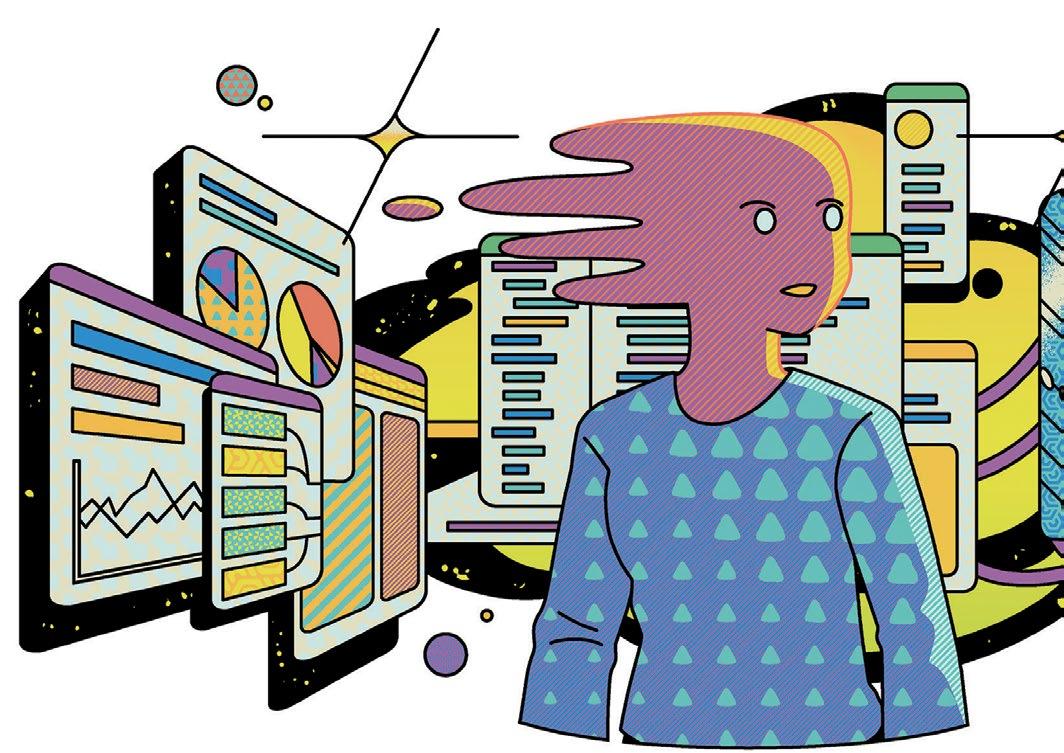
Data scientists are the cowboys of the computer world, wrangling herds of data into metaphorical fences. According to Nick, “The way I explain data science to people is that it’s at the crossroads of computer science and math. It combines a lot of the core CS and math classes needed for those majors while having a few of its own required classes as well. It’s one of the newest majors that Tufts offers…so it’s been great to see it grow over the past few years along with the field of data science in general.” Students will learn how to analyze data to solve real-world problems through techniques such as statistics, data visualization, and machine learning. And with the co-op program, students can gain valuable industry experience and put the skills they learn—from SQL programming and modeling to technical communications—to the test!
ELECTRICAL ENGINEERING (EE) INTERVIEWEE: Teo Patrosio ’23 from New Milford, NJ
Do you admire Ben Franklin and his lightning kite experiment? May I introduce you to electrical engi neering…a way less dangerous way to play Zeus? As you can guess, electrical engineering is all about electricity! More specifically, this field focuses on utilizing electrical energy and providing the maxi mum possible power with minimal waste. “The electrical engineering major teaches students the breadth of knowledge required to be an electrical engineer such as circuits, logical foundations, pro gramming, and design. On top of these foundations, students learn design and have opportunities to specialize in computer architecture, computation, robotics, and much, much more. I personally have focused on specialized hardware in a research set ting targeting RTL, VLSI, and computer architecture problems. I have also gained industry-level software skills through internships. I think EE at Tufts fosters individuals’ interests and allows every student to figure out the best path for them,” Teo says. The EE major has two tracks. Students can concentrate on analog EE, which is more physics-driven as classes are focused on wires and waves. They can also take the digital EE path, which is more data-focused and involves binary and computer logic. The digital track is actually closely aligned with the computer engineering major. Double majoring potential for all overachievers! Like most of the engineering majors at Tufts, electrical engineering is applicable every where (you might be noticing our interdisciplinary theme). From medicine to robotics to power distri bution, students can definitely combine their EE background with other disciplines.
INTERVIEWEE: Maddie Hallen ’24 from Waterville, ME
It might not be easy being green, but it’s arguably the most pressing task of the 21st century. If you agree, environmental engineering could be your path to making an impact. Environmental engi neers consider the natural environment and the impact of human activities in order to develop a sustainable society. Their work is at the forefront of climate change resiliency and global health research. Examples of student projects include designing water purification systems, designing green buildings, and remediating sites contami nated by chemical spills or human activity. Maddie explains, “Environmental engineering is a challeng ing major that allows you to explore engineering in relation to sustainability and public health as well as more classic forms of engineering. I chose this major because I was interested in engineering for epidemiology, and courses such as Biostatistics and Public Health Engineering have allowed me to explore topics and nuances that I hadn’t consid ered to be part of the field before. The community of environmental engineers is collaborative and supportive, and we all share a common love for the environment and making our planet a better place. At this point in time, facing many global health crises related to climate, the work feels important and relevant, and keeps my motivation and passion strong.” Those studying EVE will learn about policy, urban planning, clean energy, chemis try, economics, history, public health, world culture, and justice in order to better serve their local and global communities. Tufts engineers aren’t just amazing technically. They’re also ethical, respon sible, and oriented towards creating change.
HUMAN FACTORS ENGINEERING (HFE) INTERVIEWEE: Evy Miller-Nuzzo ’24 from Newton, MA
Human factors engineering, also known as engi neering psychology or ergonomics, is yet another multidisciplinary field of study that incorporates psychology, biology, computer science, cognitive brain science, and mechanical engineering. Human factors engineers study how people interact with objects and how their mental, emotional, and physi cal states change. In other words, they incorporate the “human element” when designing products, pro cesses, and systems that are safe and easy for people to use. Evy describes her major this way: “[HFE] is a unique major at Tufts that combines the psychology side of design with the mechanical engineering side. The way humans interact with the world around them is a crucial part of how devices should be built, and so many of my classes focus on critical thinking and evaluating users. These per spectives are then put into use by other classes that teach us hard skills like coding, laser cutting, computer-aided design, and more. We’re encour aged to apply our knowledge to flawed designs and even products we come up with on our own. Once you learn about a human factors concept I prom ise you’ll notice it everywhere you go - it’s truly an applicable (and growing!) field.” The goal of HFE is to reduce human error, increase productivity, and enhance the user experience. Although many gravitate towards user interface/user experience (UI/UX) research, web design, artificial intelligence, and human-robot interaction, some students are applying the design thinking learned in classes to business fields like marketing and behavioral eco nomics. Other students research for the military (fun fact: HFE began in the military), design medical devices, investigate transportation accidents, and
handle communications. At its core, this major is incredibly innovative, and Tufts is one of the few uni versities that offer it as an undergraduate major. As HFE is housed within the Department of Mechanical Engineering, students in this major can participate in the co-op program.
MECHANICAL ENGINEERING (MECHE) INTERVIEWEE: Andrew Daetz ’23 from Mountain View, CA
If you like fiddling with gadgets, this last major will really grind your gears (in a good way). If I were to describe mechanical engineering in one word, it would be “tangible.” This major involves a lot of hands-on work. MechE deals with anything involving heat transfer, design, and movement in a mechani cal system. In other words, mechanical engineers figure out how machines and devices work. Anything from car parts to a dishwasher to bike gears—these are all designed, built, and improved by mechanical engineers. Tufts students learn about mechanics, thermodynamics, material science, and micro/ nanoelectromechanical systems. They also learn about engineering ethics and how to design proj ects that will have a global impact. After all, since machinery is everywhere, no industry is beyond the scope of mechanical engineering. Students are encouraged to look beyond gears and levers by branching out into the worlds of sustainable energy, biological systems, and the human brain. No wonder it’s the most popular engineering major at Tufts! To get hands-on experience in a hands-on major, Tufts students can participate in our co-op program. They can also complete projects in design labs and machine shops. The Bray Lab and Nolop FAST Facility are some of the most popular maker spaces visited by our MechE students, who take full advantage of the state-of-the-art equipment. Recently, students have made a medical prosthesis called the iWalker 2.0 and designed air-sensitive sensors for COVID-19 respirators. Others are work ing on an exoskeleton made with soft robotics, and many more are researching small search and res cue robot designs. Andrew can explain the major with enthusiasm: “Mechanical engineering has been a great way for me to foster my passion for designing and creating unique solutions to everyday problems. The student body is extremely supportive and diverse, and the extensive group work we do ensures that our problem-solving skills combine to yield more than the sum of our individual ideas. Both the faculty and the facilities are top-notch as well, and the makerspaces on campus are a home away from home for us students. MechE is certainly a lot of work, but there’s never a dull moment!”
If you’re still reading this, congratulations! You have the stick-to-itiveness necessary to be an engineer. You’re certainly more knowledgeable than we were when we were in your shoes. So, can we consider this “major conundrum” resolved? Phew! Now, maybe one of these majors caught your attention. We encourage you to explore more! Be curious! Challenge yourself! And keep in mind, you don’t have to know which major is right for you when you apply to the School of Engineering. You have until the spring of your first year to declare, and there’s a ton of exploration beforehand.
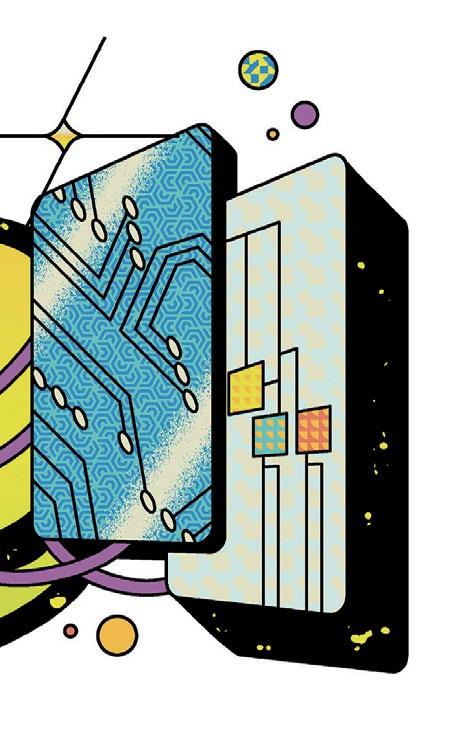
“AND HERE COMES THE MAJOR EVERYONE KNOWS ... OR DO YOU REALLY?”
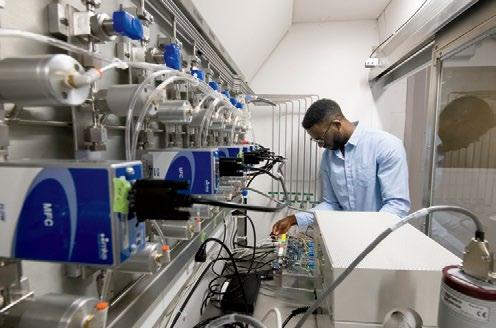
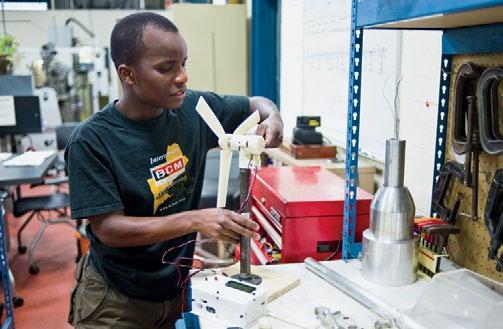
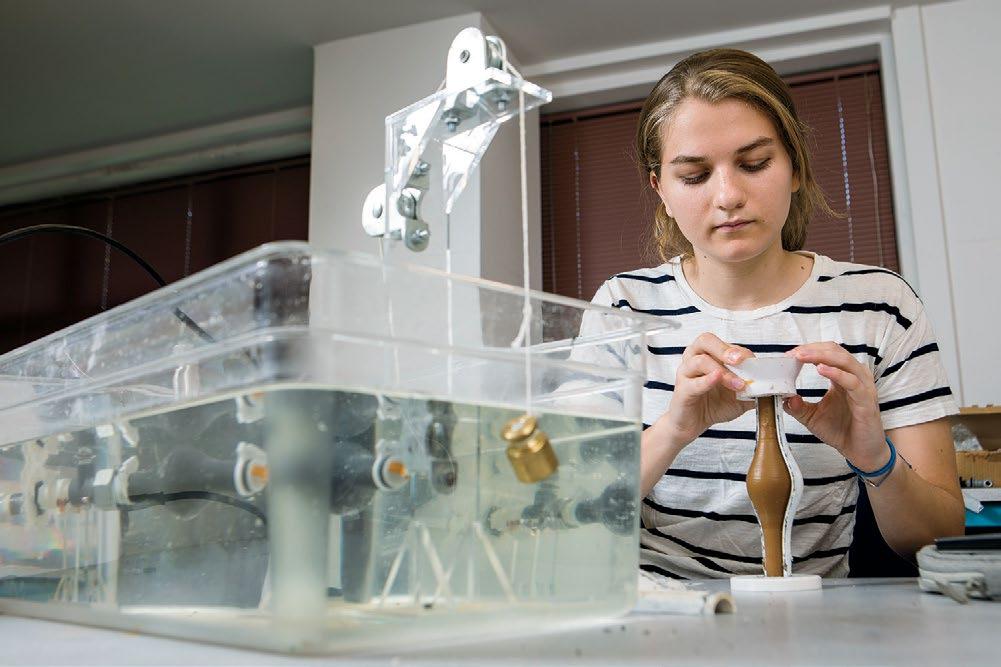
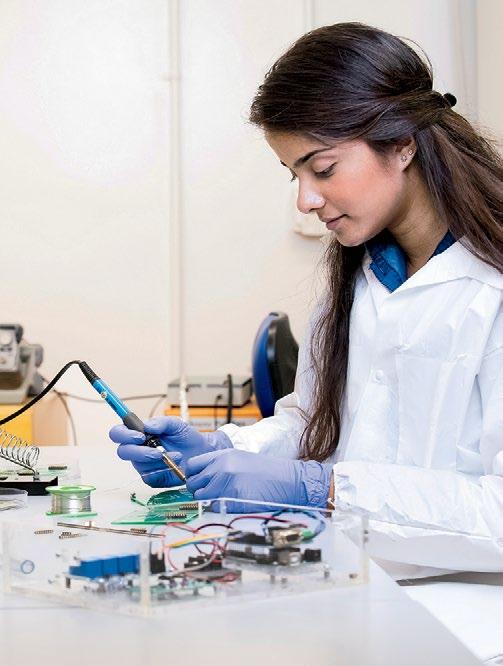
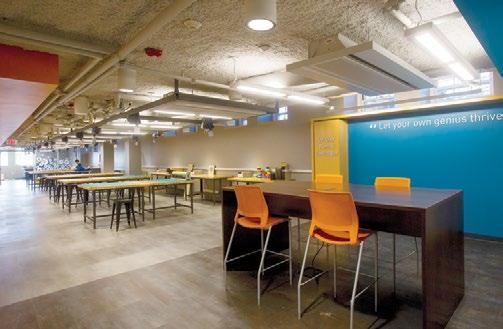
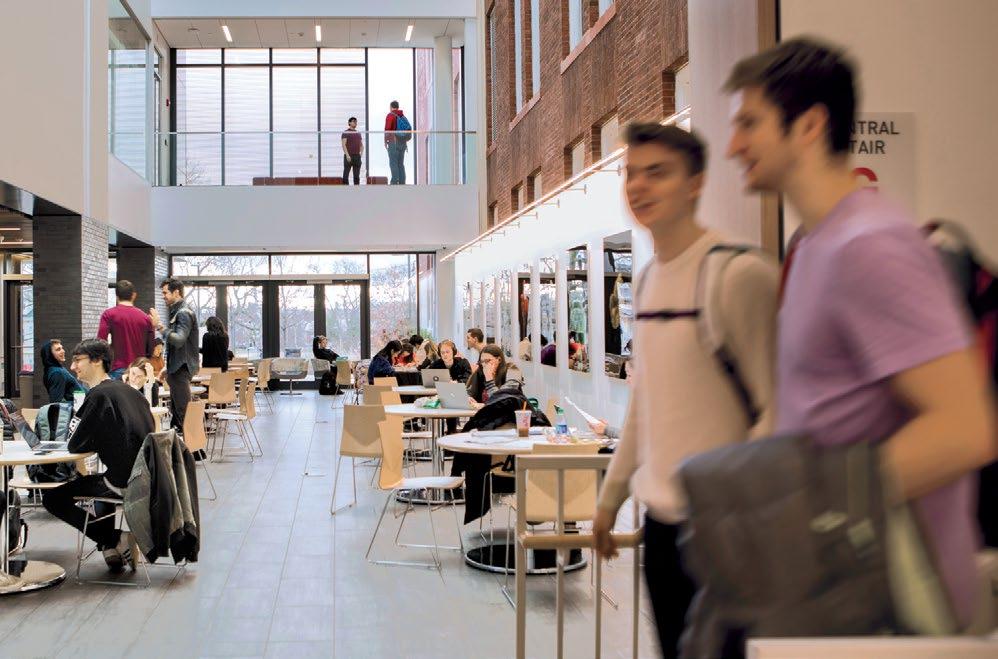
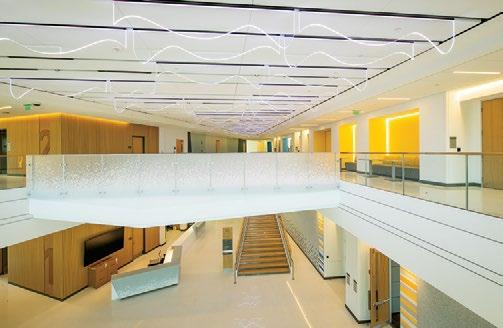
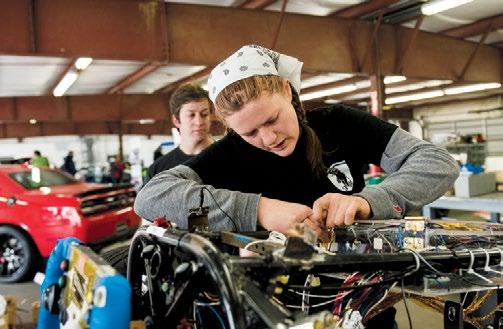
Center for Engineering Education and Outreach (CEEO): The CEEO has more than 20 years of experience in improving engineering educa tion in the classroom, from kindergarten to college. The engineering education research program is aimed at understand ing how kids and adults learn engineering, which informs the CEEO’s development of educa tional tools for the classroom. The CEEO buzzes with activity on a daily basis, with undergradu ate students developing and testing innovative educational technologies, staff members facilitating teacher workshops, and visiting professors sharing their knowledge.
Science and Engineering Complex (SEC): The SEC reflects Tufts’ interdisciplinary culture and shared belief that collaboration strengthens education and increases the potential for discovery. A 175,000-square-foot facility, the SEC features laboratory suites, teaching laboratories, and social spaces—including a light-filled atrium where students gather to work and chat.
BY ALONSO NICHOLS, ANNA MILLER, AND RYAN MCBRIDETufts Gordon Institute: For over three decades, the Gordon Institute has provided students with the knowledge and skills they need to be impactful lead ers—-from individual projects to entire companies. In engineer ing management, foundations for future leadership and entrepreneurship programs, stu dents are taught by faculty who have started and run their own companies. Through classes, hands-on projects, events, and workshops, students gain the tools necessary to develop innovative ideas—and many go on to become leaders in public, private, and nonprofit companies.
Bray Lab: Part of the Department of Mechanical Engineering, the Bray Lab machine shop is a full manu facturing facility featuring manual and CNC lathes and milling machines, laser cutters, 3D printers, band saws, and drill presses.
Center for STEM Diversity (CSD): Established in 2008, the CSD partners with the School of Engineering and the School of Arts and Sciences to foster a diverse and inclusive science and engineering learning environment. The CSD focuses on strengthening meaningful student participa tion in science and engineering, specifically for those histori cally excluded from the STEM fields, including women, Black Americans, Native Americans, members of the LGBTQIA+ com munity, and those who identify as Hispanic and/or Latinx. The CSD also works intentionally with first-generation college students and with students from low-income backgrounds.
Nolop FAST Facility: As a makerspace open to every one at Tufts, the main goal of the Nolop FAST Facility is to help students succeed in making something amazing by providing a large collection of well-maintained tools and teaching safe use. Tools include 3D printers, a laser cutter, a CNC router, a power drill, a table saw, a miter saw, and many others.
Joyce Cummings Center (JCC): Located right next to the new Green Line MBTA station, the recently completed JCC is home to the Data Intensive Studies Center, the Departments of Computer Science, Economics, and Math, and the Tufts Gordon Institute. State-of-the-art laboratories, brand new classroom and event spaces, and ample room for studying and collabo rating with peers are open and available to every Tufts student. And if you need a snack break, there’s even a Starbucks on the first floor.
The Venture Lab: The Venture Lab, located on the first floor of the Collaborative Learning and Innovation Complex (CLIC) building at 574 Boston Avenue, is a working space specifically designed for student-led startup groups to connect and collabo rate on their projects and ideas. It is also a major resource for students to connect with profes sionals who are experts within their field or industry through oneon-one office hours. Many groups who use the Venture Lab partici pate in the annual $100k New Ventures Competition—where teams of student entrepreneurs compete for a slice of $100,000 to fund their business plans.
Designing, building, and inventing are at the core of Tufts Engineering. Whether revolutionizing robot communication, advancing autonomous vehicles, or problem-solving patient-saving equipment during a pandemic, Tufts engineers don’t wait until after they graduate to innovate.
Tufts engineers solve problems outside and inside of the classroom. As part of his mechanical engi neering design class, Kamar Godoy ’22 designed a flowmeter that would help adjust ventilators to treat more COVID-19 patients. As hospitals became more crowded and life support resources more limited at the height of the pandemic, doctors projected the need to have four people per ventilator. Kamar’s apparatus could help further reconfigure ventilators and balance airflow equally to multiple people.

You can find many Tufts engineers partnering with local and global communities to kick-start their senior design projects. Max Ramer ’22, Aryaman Pandya ’22, Ethan Schreiber ’22, and Sinan Unan ’22 utilized programmable logic controllers with information stored on a human-machine inter face panel to digitize and automate how a STEM school in Somaliland kept track of water levels and potential leaks in their water tanks. The project not only tested their electrical and computer engineer ing knowledge…it also challenged them to flex their fluency in carpentry, electrician skills, and plumbing.
For their product design class, Becky Lee ’22, Katie Jordan ’22, Noaf Alsheikh-Ali ’22, and Sami Rubin ’22 formed the team MedCo and took on a challenge from Design Science, a human factors engineering company located in Pennsylvania. For this semester-long project, the team performed user research, planned usability tests, and designed an app and interactive pillbox to help address medical non-adherence in the elderly population.
If you can’t send a human to explore the rocky ter rain of an asteroid, you can ask Anoushka Alavilli ’22, John Batchelor ’22, John Freeman ’22, James Lai ’22, Keenan Rhea ’22, and Rebecca Skantar ’22 to send their robot instead. GPS isn’t as reliable for navigating the unknown (and potentially hazardous) surface of an asteroid, so this team built a robot outfitted with a LiDAR sensor, an inertial measure ment unit, and a camera that allows it to safely make its way around obstacles and orient itself in new surroundings.
Visualizing a Robot’s Perspective of the World
Want to learn what’s going on inside the mind of a robot? Professors Jivko Sinapov and James Schomolze tasked their students to better under stand the what and the how of a robot’s mind.
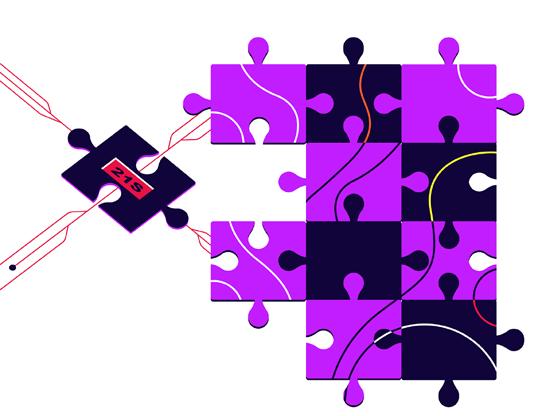
Throughout the course, they built augmented real ity software to project robots’ inner thoughts. This brought them one step closer to improving how robots communicate with humans.
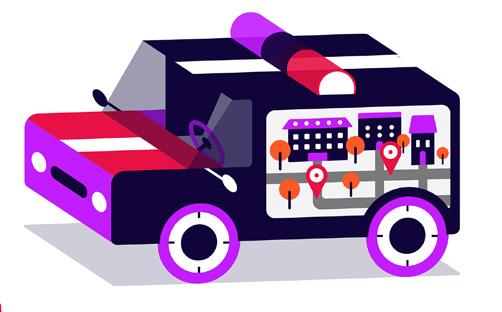
What can Tufts engineers invent with a budget of $400 and three months’ time? A group of human factors engineers created a vacuum impeller, motor, suction mechanism, and power system...all to build their very own autonomous, high-powered, highvolume, industrial shop vac!
Did you know that a new stop on the extension of the Boston subway system is coming to Tufts?
Students in our Data Structures course were assigned the project of creating efficient code for this train system. They built out and applied algo rithms to keep track of passengers embarking and disembarking trains and the movement of train cars between stations.
When she was assigned a pendulum project with other students in her engineering science class, Madeline Fabela ’23 faced her first-ever intensive coding challenge. After building a two-foot-tall pen dulum in the Nolop FAST Facility, her team gathered data about the acceleration, displacement, and speed of the pendulum, and then wrote a script that analyzed and plotted the data. The project not only introduced her to computer programming, but also allowed her to better understand what she was learning in her physics course.
Imagine building and inventing for kids attending a school right on the Tufts campus. For students enrolled in Inventing Smart Toys for Kids , that is exactly what happened. One team brought together circuits, writing code, and crafting puzzle pieces with neodymium magnets to develop an electronic puz zle that would know when it has been completed. They even created an app so parents could see how long it took their children to complete the puzzle.
Nolop is one of many makerspaces on our cam pus, and students flock to this space for the expert advice (and humor) from Nolop staff in addition to a wall of 3D printers (also known as the “3D printer farm”), laser cutters, oscilloscopes, and so much more. Students have made everything from an Adirondack chair to a tank robot to a rainbow clock to a pinball machine.
Tufts students are always helping each other! Design for Social Good (DSG) club members worked together with Tufts’ Emergency Medical Services (TEMS) to create an ambulance tracker system. Built from Arduinos, this tracker updates the loca tion of the university’s EMS truck every 10 seconds and collects driving data. With this information, the student EMTs working for TEMS can organize better shift changes and improve their response to medi cal emergencies. A safer and healthier campus to look forward to!
A love of teaching is at the heart of Professor Lucy Jen’s practice, both in and out of the classroom. With her career as a geotechnical consultant largely for construction projects, Professor Jen has taught all over the Boston area, from Tufts to MIT to Northeastern. She has even been involved with the Massachusetts Bay Transportation Authority (MBTA) Green Line extension that is expected to open this year, providing her expertise on its potential impacts to the environment.
The unique role of a Professor of the Practice at Tufts allows Professor Jen to bring that expertise to the classroom and beyond directly to students. “In the Department of Civil and Environmental Engineering (CEE), we’re professors who have exten sive consulting experience. The idea is we bring some of those experiences into the classroom and show students how what they’re learning is applied in the professional realm.” Those contacts and experiences extend beyond the classroom itself.
“I actually make a point to bring the students to con struction sites and get their boots dirty. Hopefully we go out on cold winter days so they realize the difficulty and gain respect for the people who have to work and build all of the beautiful infrastructure that we take for granted most of the time.”
Consulting work also goes beyond just the job site. Professor Jen taught her dream course recently, titled Forensic Geotechnical Engineering, which drew from her experiences as an expert wit ness in various court cases throughout the years.
“If, in an engineering project, something moved more than it was supposed to move and two parties end up in litigation, I work as a consultant to help investigate and explain that…The idea is to have engineering students be aware that their designs have implications.”
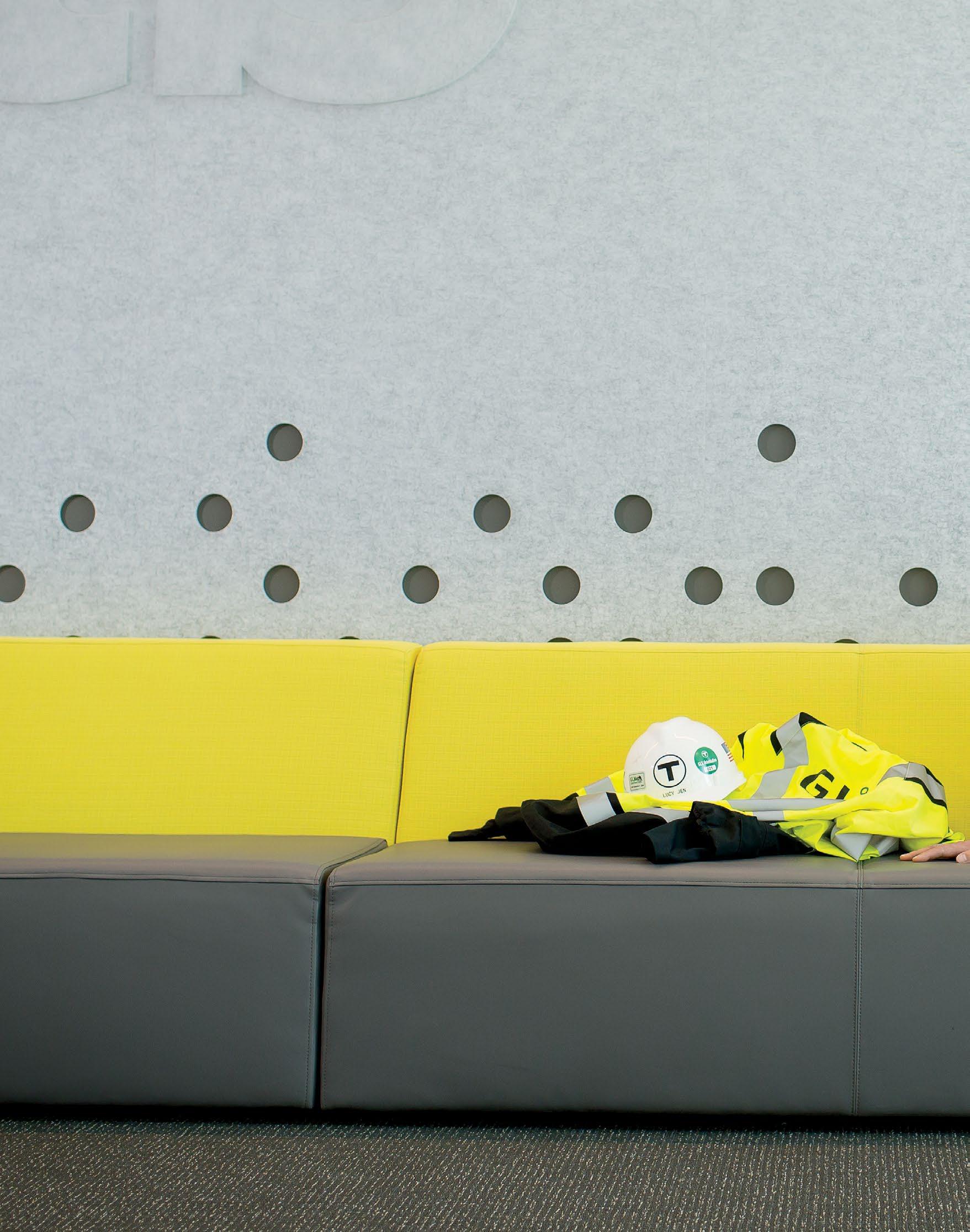
As for the community at Tufts, Professor Jen is “extremely happy” to be here. “It’s just the nicest group of people…It’s a great environment to work
in.” Students here introduced her to the concept of compliment sandwiches, where when you are giving someone a critique on a project, you start and finish with a compliment. When she first heard about it, she said, “I just paused and was like, wait, all my life I’ve never received any compliment sandwiches!” Her advice to prospective students is to make the most of the community. “Calculus is calculus, but what you’re going to remember is who is sitting next to you on a daily basis. That’s your friend. And that person is going to be with you and grow with you for the rest of your life” Tufts students are supportive, kind, and collaborative. With the environment that instructors like Professor Jen create, it’s no surprise that Jumbos find that they can thrive here.
“I actually make a point to bring the students to construction sites and get their boots dirty.”
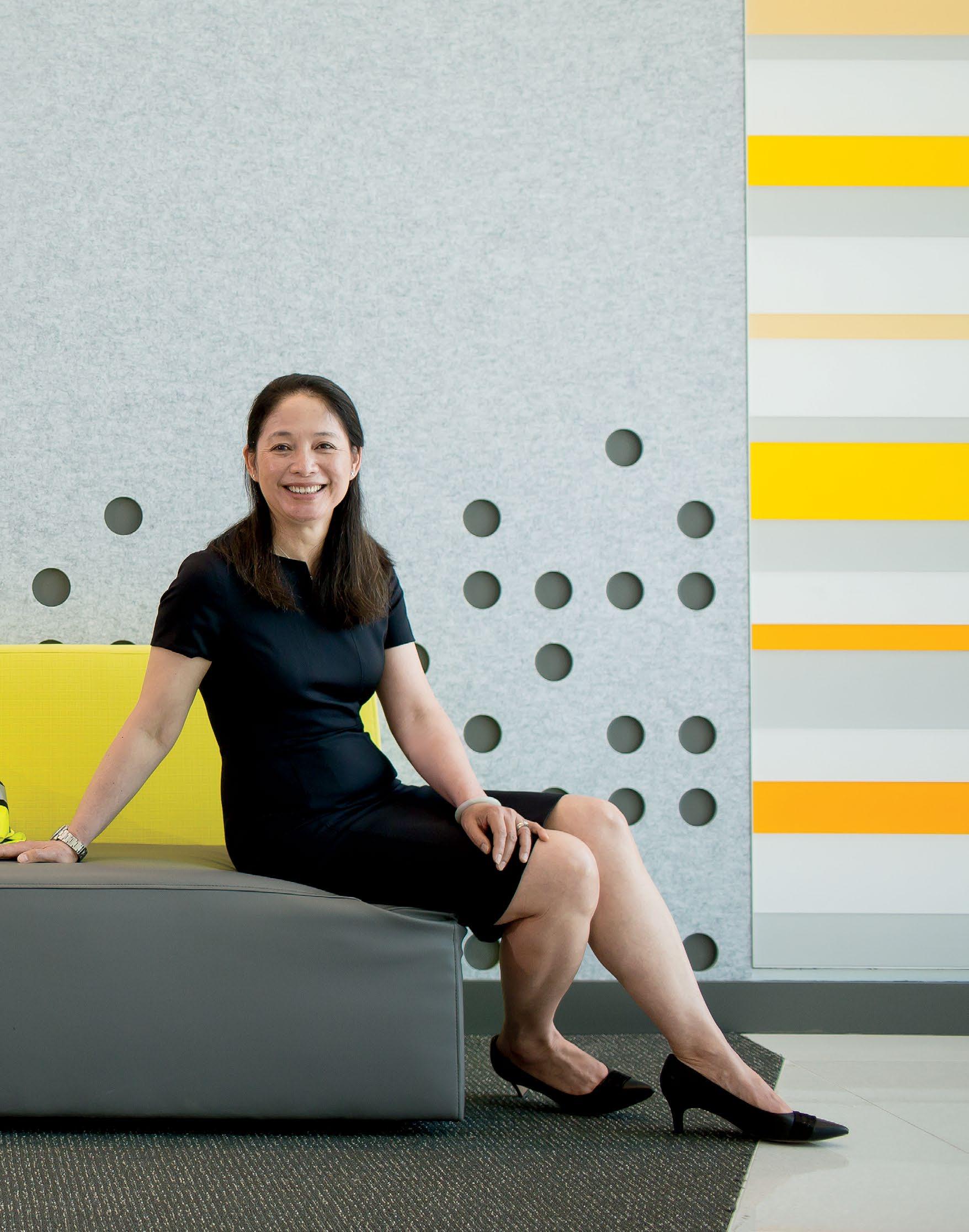
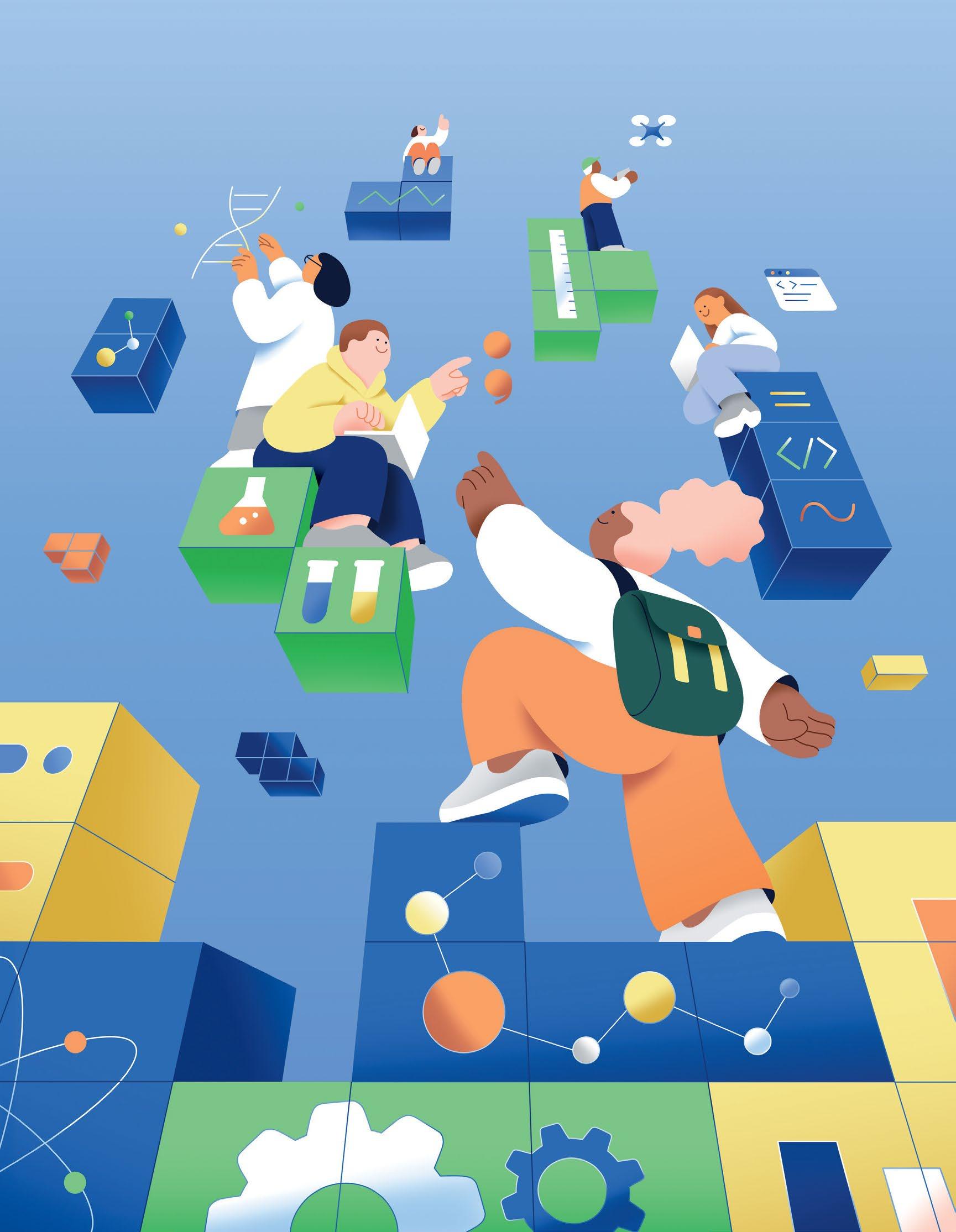
Launched in 2018, Tufts’ School of Engineering Co-Op Program is a relatively new initiative that has already had a large impact. Through this program, students majoring in the Departments of Biomedical Engineering (BME), Mechanical Engineering (ME), and Computer Science (CS) are able to spend a semester of their undergraduate career working fulltime for a company of their choice. Since human factors engineering (HFE) and data science (DS) are available under the Departments of Mechanical Engineering and Computer Science respectively, students in those majors are able to complete the program as well.
As students are not taking courses at Tufts dur ing the semester they are working, they do not pay Tufts tuition. Though they remain Tufts students
for the duration of the program, the full-time work also comes with a full-time salary offered by the company they work for. As all participants in co-ops are still Tufts students, they can still participate in varsity and club sports, use the library and other campus services, and attend any Tufts events, even though they are not enrolled in any courses or earn ing any academic credits during that time. Since students are not taking courses, they are not able to receive financial aid during this time, but all earn ings from co-op opportunities will not count towards future financial aid eligibility. International students are also eligible for the program through curricu lar practical training, which authorizes off-campus experiential learning that is related to and integral for their field of study. For all students, this program
focuses on providing on-the-job experiences for undergraduates interested in learning more about career opportunities in their engineering field by creating moments for students to network with and learn new skills from industry professionals.
All interested students must take a course, prior to their co-op, where they learn career devel opment and basic employment competency skills like resume and cover letter writing, LinkedIn and networking skills, interview and negotiation tech niques, and the general expectations of being a working professional. Students enroll in different sections of the course specific to their major. Each course is facilitated by a Tufts faculty mem ber from that specific department, along with the support of members of Tufts Career Services who
Tufts offers a wide variety of ways for students in the School of Engineering to develop—whether it be as community members, students, or working professionals. Outside of the multitude of research opportunities and labs where Jumbo engineers can gain hands-on experience, there is another, lesser known, experience for dedicated students: the Co-Op Program. Read on to learn more about this program unique to certain engineering majors here at Tufts.
not only teach students, but also help them make sure that they will be able to fit the program into their schedule. Industry guest speakers also make appearances, providing even more opportunities for networking and career development through their insight and expertise.
After taking the introductory course, students will move on to full-time work the following semes ter at a company whose work is in line with their program of study. Students are expected to take the skills they’ve learned in the introductory course to find a co-op that fits their interests best, with some help from the Career Center along the way. Robin Kahan, the Associate Director of Engineering Career Services in Tufts’ Career Center, says, “We are always looking for companies to hire students for co-ops, internships, or full-time positions.” Some companies will post positions to Tufts Career Center sites specifically for members of the pro gram, which makes finding a position incredibly easy. Opportunities are posted by the companies
on Handshake, the job aggregation site that Tufts uses for its students and alumni, and must include the title, pay, and benefits that students will be eligible for.
Though the program requires an academic semester, each full-time job that students work through the program takes six months to complete.
For those who are worried about finding the time, or credits, to make this program fit within their sched ule, Robin has only assurances. “Many students can do [the program] and graduate on-time because they have pre-matriculation credits, take courses during summers, or [take extra courses during the semester] while at Tufts.” Some students are such big fans of the program that they do it more than once. “We have had at least one student do two co-ops and graduate a year later than her class, but with a year of great experience under her belt.”
Participating in the introductory course mentioned earlier does not necessitate participating in fulltime professional work for a semester either. It can
include just taking on an internship for the bulk of the semester or summer. Many students have “decided to do the three month internship rather than do a co-op” depending on their situations and plans for their undergraduate careers and future. Regardless of where the course leads, on its own it is an incredible career development opportunity, both for the connections students are able to make and for the interview and workplace skills they gain which they can carry with them into their future. For some, that future may be even closer than they expected. According to Professor Qiaobing Xu, who teaches the introductory co-op course for BME stu dents, “One student worked at Vaxess through this program and was recruited as a full time employee after she graduated.”
So if you’re curious, reach out to someone involved in the program! You never know what doors may open for you when you do.
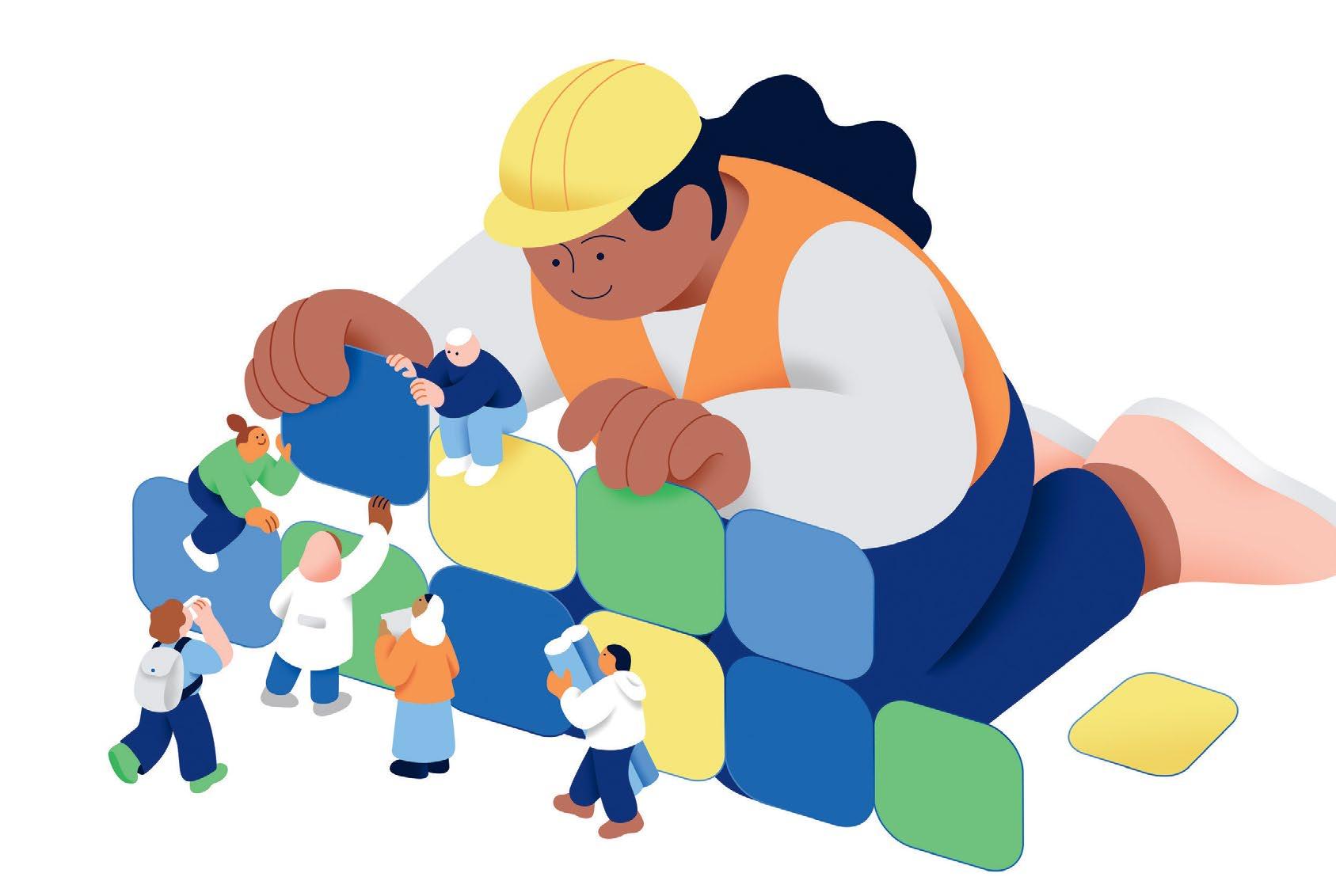
If chemistry is your passion, then Professor Deshlahra is someone you should meet. In fact, his passion for catalysis in particular is what led him to Tufts. “I really enjoyed the research [on cataly sis] I did at both [Berkeley and Notre Dame] so I applied for faculty positions at places that do good work in that. I was really impressed by the research groups when I visited Tufts and by the kinds of questions that students asked during seminars.” Those student questions especially made for the right environment for him. “Having small groups but being in close interaction with them, and work ing with undergraduates—that was all very exciting to me.”
Professor Deshlahra’s love for chemistry began back in high school. A preference for the subject, along with a strong mathematics background, pushed him towards the field of chemical engi neering when he went to college. “I was intrigued by the applications to energy and the environ ment, [especially] trying to understand chemical processes and trying to design components or materials that help them run most efficiently and safely and using that to address challenges.” His research may be focused on understanding and
designing chemical catalysts, but the implica tions and impact are broad. Chemical engineering impacts so much—“making products we use in our daily lives, addressing challenges like energy, making batteries, or designing drugs…The chemical industry is a multi-billion dollar industry. They use a lot of energy and produce a lot of side products that can harm the environment. My research is focused on how to make that process of chemical produc tion more efficient, more sustainable.”
The Deshlahra Lab in the Department of Chemical and Biological Engineering is where this work takes place. Supported by both graduate and undergraduate students, Professor Deshlahra creates new catalysts and uses calculus and spec troscopy to test their efficiency. “The catalysts are typically high surface area porous powders and when you zoom in on the nanoscale they have very small metal particles or some combination of met als and oxide. So we make catalysts and test them, then look at how they appear using spectroscopy. In addition, we do computational work where we make models of the atomic arrangement and run simulations to see how stable a particular reaction would be and which path it’s most likely to take.”
Undergraduate students can make real contribu tions in the lab as well. “They bring a lot of energy, they ask good questions, and they’re excited,” all of which tend to matter the most when learning something new.
In terms of teaching, one of Professor Deshlahra’s main undergraduate courses is Reactor Design. It involves “trying to model a reactor, and looking at the size of the reaction and how things are flow ing, what do you expect the output to be? It’s really exciting to teach. We apply a lot of things that stu dents have learned earlier and combine it with code writing using Python, so it’s a fun course.” He also designed a course called Computational Chemistry and Applications to Catalysis which teaches students “how to use quantum mechanics to do atomic scale modeling and apply those concepts to a project of their own choice. It’s very exciting to see students of different backgrounds apply the knowledge to a project that they started in another class.” The interdisciplinary mindset that permeates the Tufts experience can truly be found everywhere. And with professors like Prashant Deshlahra supporting you, exciting discoveries are just a step away.
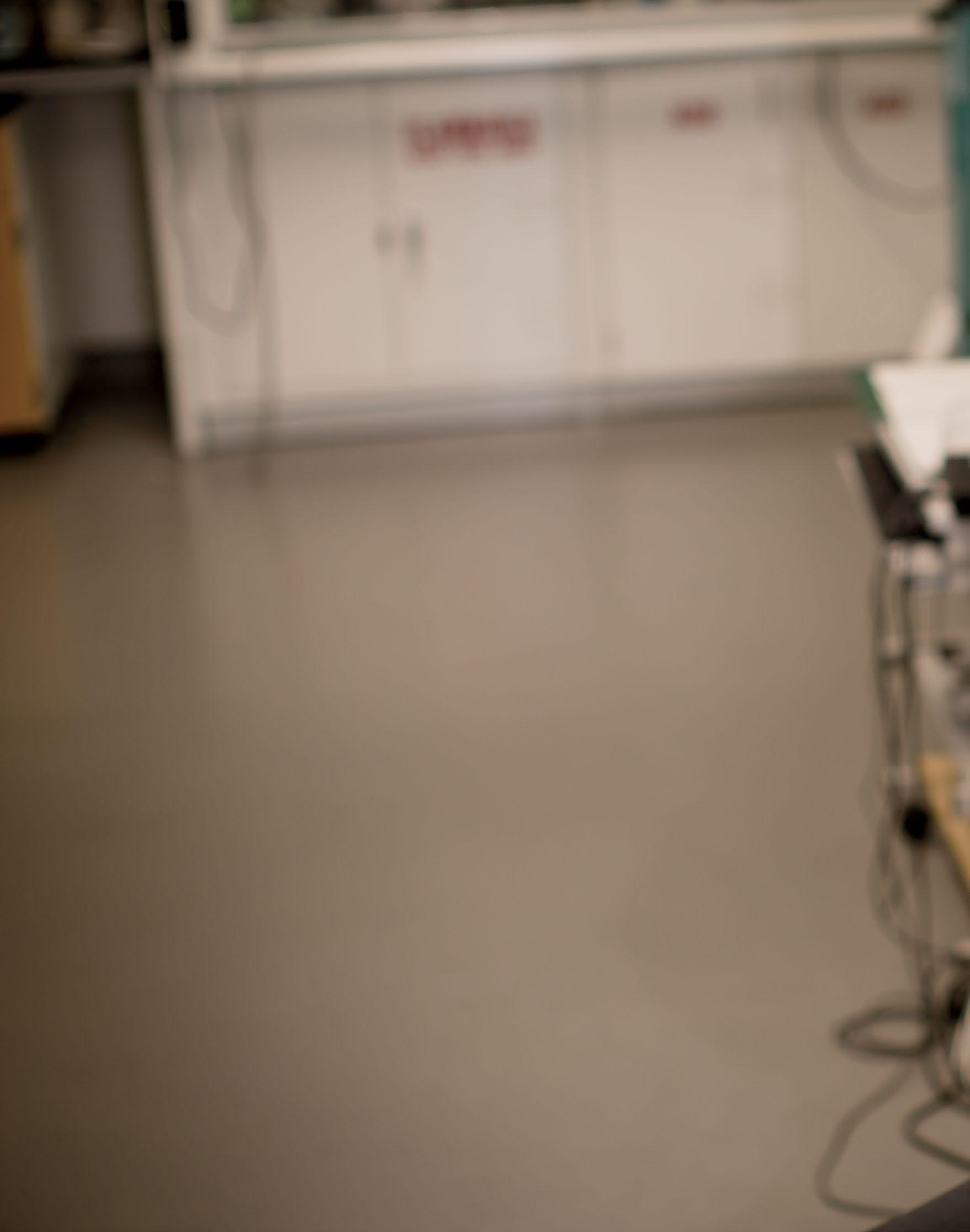
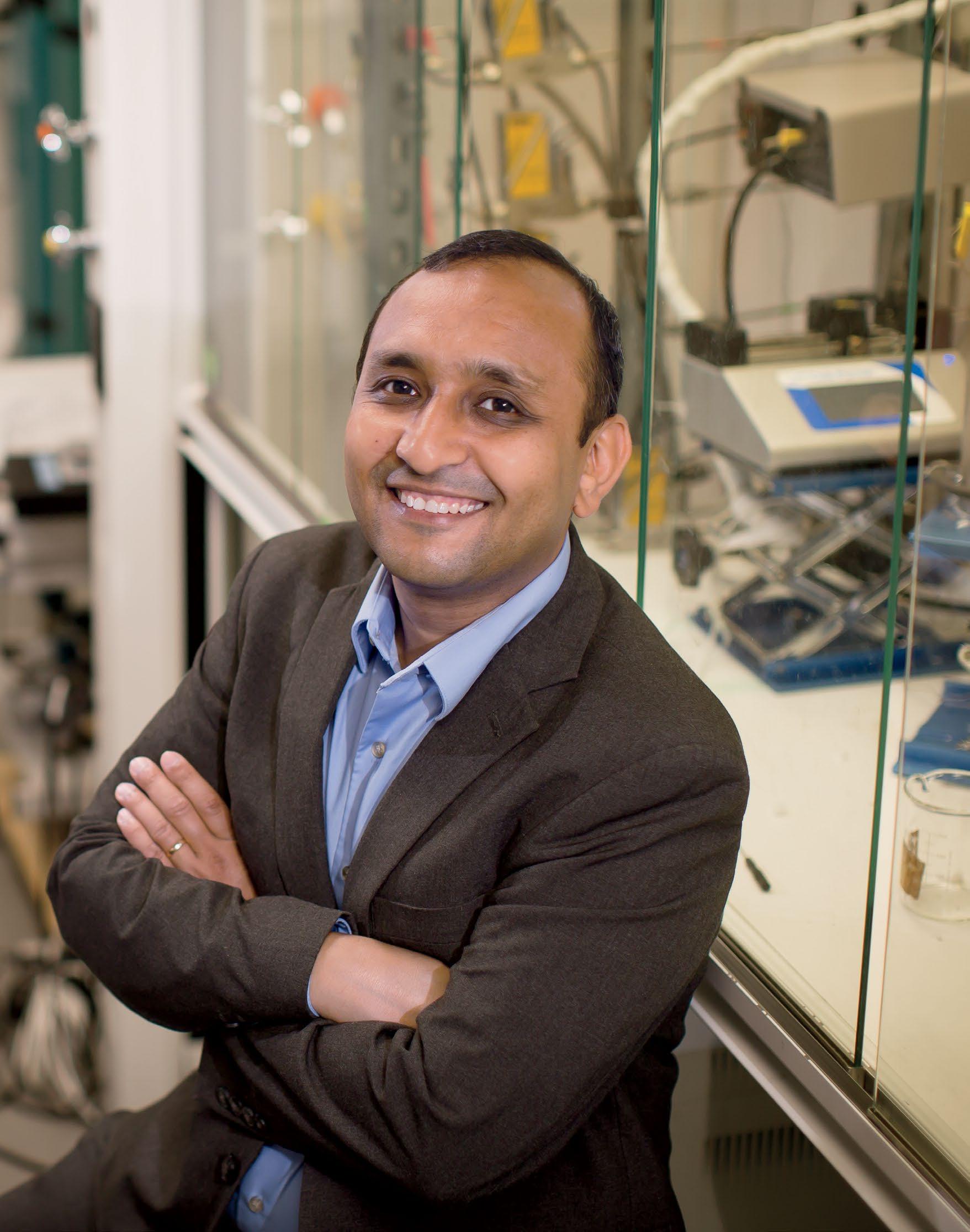
“My research is focused on how to make that process of chemical production more efficient, more sustainable.”
Whether
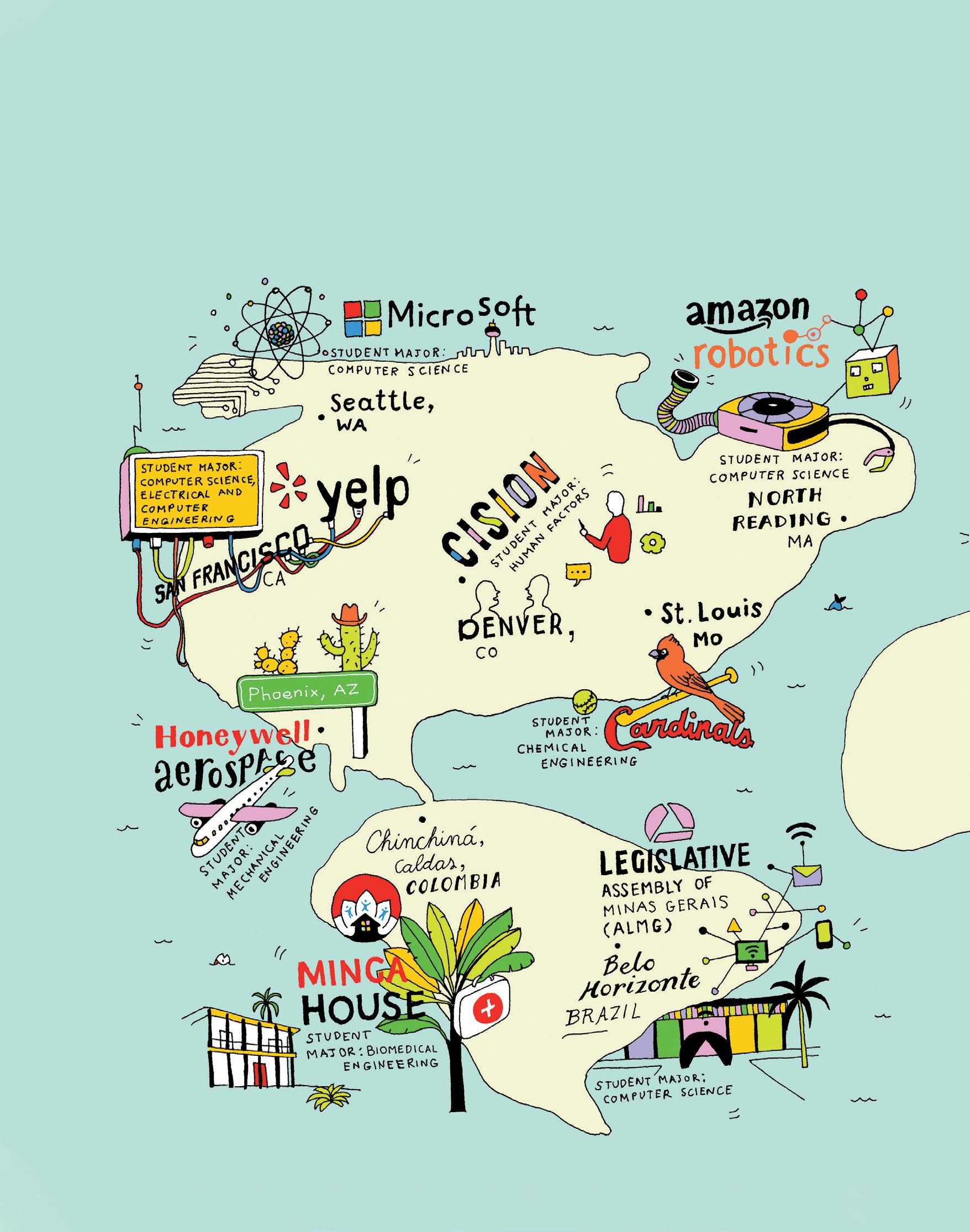
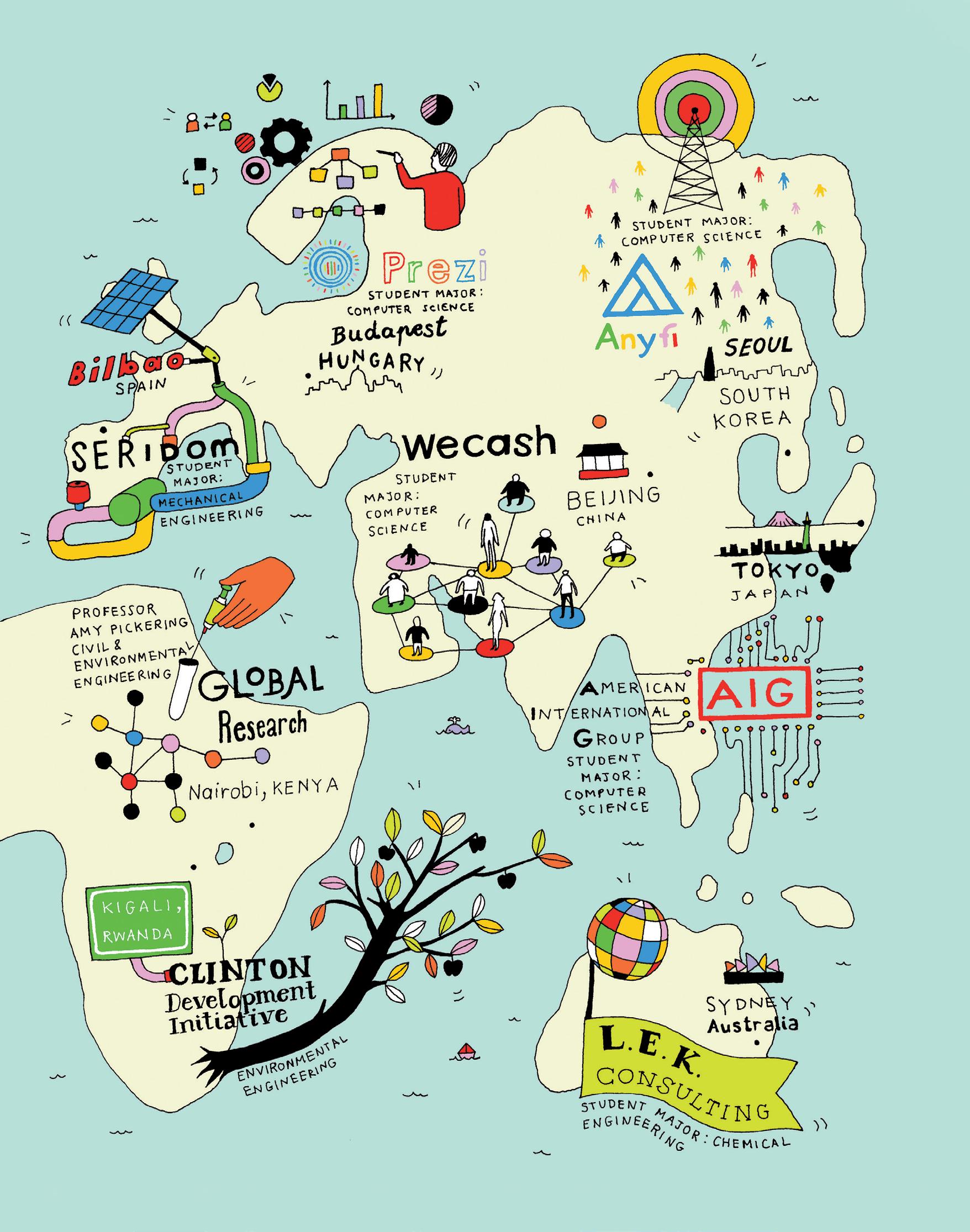
Your
Expected
Tuition
*Grants
is
(FAFSA),
(EFC)
amount
the information
family is expected to pay for
on your Free Application for
and your family’s federal tax returns. Your financial need
the annual cost of attendance and your calculated family contribution.
make up the difference, for all four years—even if your family’s
not
Tufts
are not
loans for students whose families earn
is need-based—we do not offer merit-based
back.
COMPLETE
With nearly 150 majors and minors, 30 interdisciplinary programs, and the courses of the Experimental College, Tufts’ offerings require more than a brief skimming, so you can find the most up-to-date and expanded version of this quick list on our website. But in the meantime, skim away. Just note that Tufts’ undergraduate programs are offered in three schools: Arts and Sciences, Engineering, and the School of the Museum of Fine Arts. Students may take classes across schools, and many students do.
Africana Studies
American Studies Anthropology Applied Environmental Studies
Applied Mathematics
Applied Physics
Arabic Archaeology
Architectural Studies
Astrophysics Biochemistry Biology Biomedical Sciences1 Biopsychology Biotechnology1 Chemical Physics Chemistry
Child Study and Human Development
Chinese Civic Studies1
Classical Studies Clinical Psychology Cognitive and Brain Science Community Health Computer Science Economics Education1 English Environmental Geology
Environmental Studies1
Film and Media Studies
French Geological Sciences
German Language and Cultural Studies
German Studies Greek Greek and Latin History
History of Art and Architecture
Human Factors Engineering Interdisciplinary Studies
International Literary and Visual Studies International Relations Italian Studies Japanese Judaic Studies
Latin Latin American Studies Mathematics Middle Eastern Studies Music, Sound, and Culture Philosophy Physics Political Science Psychology
Quantitative Economics Race, Colonialism, and Diaspora Studies
Religion Russian and Eastern European Studies
Russian Language and Cultural Studies Science, Technology, and Society1
Sociology
Spanish Cultural Studies Spanish Literature Theatre and Performance Studies
Women’s, Gender, and Sexuality Studies
Architectural Studies Biomedical Engineering Chemical Engineering Civil Engineering Computer Engineering Computer Science Data Science Electrical Engineering Engineering Engineering Physics Engineering Science Environmental Engineering Environmental Health
Human Factors Engineering Mechanical Engineeringg
All BFA students at SMFA at Tufts focus in interdisciplinary art. They may explore many of the following areas of study while pursuing this interdisciplinary art education.
Animation Book Arts Ceramics Digital Media Drawing Fibers Film Graphic Arts Illustration Installation Jewelry Metals Painting Papermaking Performance Photography Printmaking Sculpture Sound Video Virtual Reality
Tufts/New England Conservatory: BA or BS and Bachelor of Music Arts & Sciences/SMFA Combined Degree: BA or BS and Bachelor of Fine Arts
Africana Studies American Public Policy Analytical Chemistry Applied Computational Science3 Arabic Architectural Engineering3 Architectural Studies
Asian American Studies Astronomy Astrophysics Biological Anthropology Biophysical Chemistry Biotechnology Chemical Engineering2 Chemical Mechanism and Structure Chemical Physics Chemistry Chemistry of Life Child Study and Human Development Chinese Cognitive and Brain Science Colonialism Studies
Comparative Government Computational Chemistry Computer Science Cultural Anthropology Dance Economics Education Engineering Education2 Engineering Management English Entrepreneurship Entrepreneurship for Social Impact Environmental Science and Policy2 Film and Media Studies Finance Food Systems and Nutrition Foreign Policy Analysis Foundations for Future Leadership French Geology2 Geoscience3 Geosystems
German Language and Cultural Studies German Studies Greek Greek Archaeology Greek Civilization Hebrew
History History of Art and Architecture Human Factors Engineering2 Italian Studies Japanese Judaic Studies Latin Latin American Studies Latinx Studies
Leadership Studies Linguistics Materials and Surface Chemistry Mathematics Medical Anthropology Medieval Studies Middle Eastern Studies Multimedia Arts Museums, Memory, and Heritage Music
Music Engineering Native American and Indigenous Studies Peace and Justice Studies Philosophy Physics Political Economy Political Science Political Thought Portuguese Religion Roman Archaeology Roman Civilization Russian Language and Cultural Studies Science, Technology, and Society
Social Justice Anthropology Sociology Spanish Studio Art Theatre and Performance Studies
Urban Studies Visual and Material Studies Women’s, Gender, and Sexuality Studies
Tufts does not discriminate in admissions, employment, or in any of its educational programs or activities on the basis of race, color, national or ethnic origin, ancestry, age, religion or religious creed, disability or handicap, sex or gender (including pregnancy, sexual harassment and other sexual misconduct including acts of sexual violence such as rape, sexual assault, stalking, sexual exploitation, sexual exploitation and coercion, relationship/intimate partner violence and domestic violence), gender identity and/or expression (including a transgender identity), sexual orientation, military or veteran status, genetic informa tion or any other characteristic protected under applicable federal, state or local law. Retaliation is also prohibited. Tufts will comply with state and federal laws such as M.G.L. c. 151B, Title IX, Title VI and Title VII of the Civil Rights Act, the Americans with Disabilities Act, Section 503 and 504 of the Rehabilitation Act of 1973, the Age Discrimination in Employment Act, the Vietnam Era Veterans Readjustment and Rights Act, Executive Order 11246 and other similar laws that prohibit discrimination, all as amended. Tufts is an equal employment opportunity/affirmative action employer. More detailed Tufts policies and procedures on this topic may be found in the OEO Policies and Procedures page.
Any member of the Tufts University community has the right to raise concerns or make a complaint regarding discrimination under this policy without fear of retaliation. Any and all inquiries regarding the application of this statement and related policies may be referred to: Jill Zellmer, MSW, Executive Director of the Office of Equal Opportunity, Title IX and 504 Coordinator, at 617.627.3298 at 196 Boston Avenue, 4th floor, Medford, MA 02155, or at Jill.Zellmer@tufts.edu. Anonymous complaints may also be made by reporting online at: tufts-oeo.ethicspoint.com. As set forth in our policies, individuals may also file complaints with administrative agencies such as the U.S. Department of Education, Office for Civil Rights (“OCR”). The contact information for the local office of OCR is 617.289.0111 at Office for Civil Rights, Boston Office U.S. Department of Education, 8th Floor, 5 Post Office Square, Boston, MA 02109-3921. The email address for OCR is OCR.Boston@ed.gov.
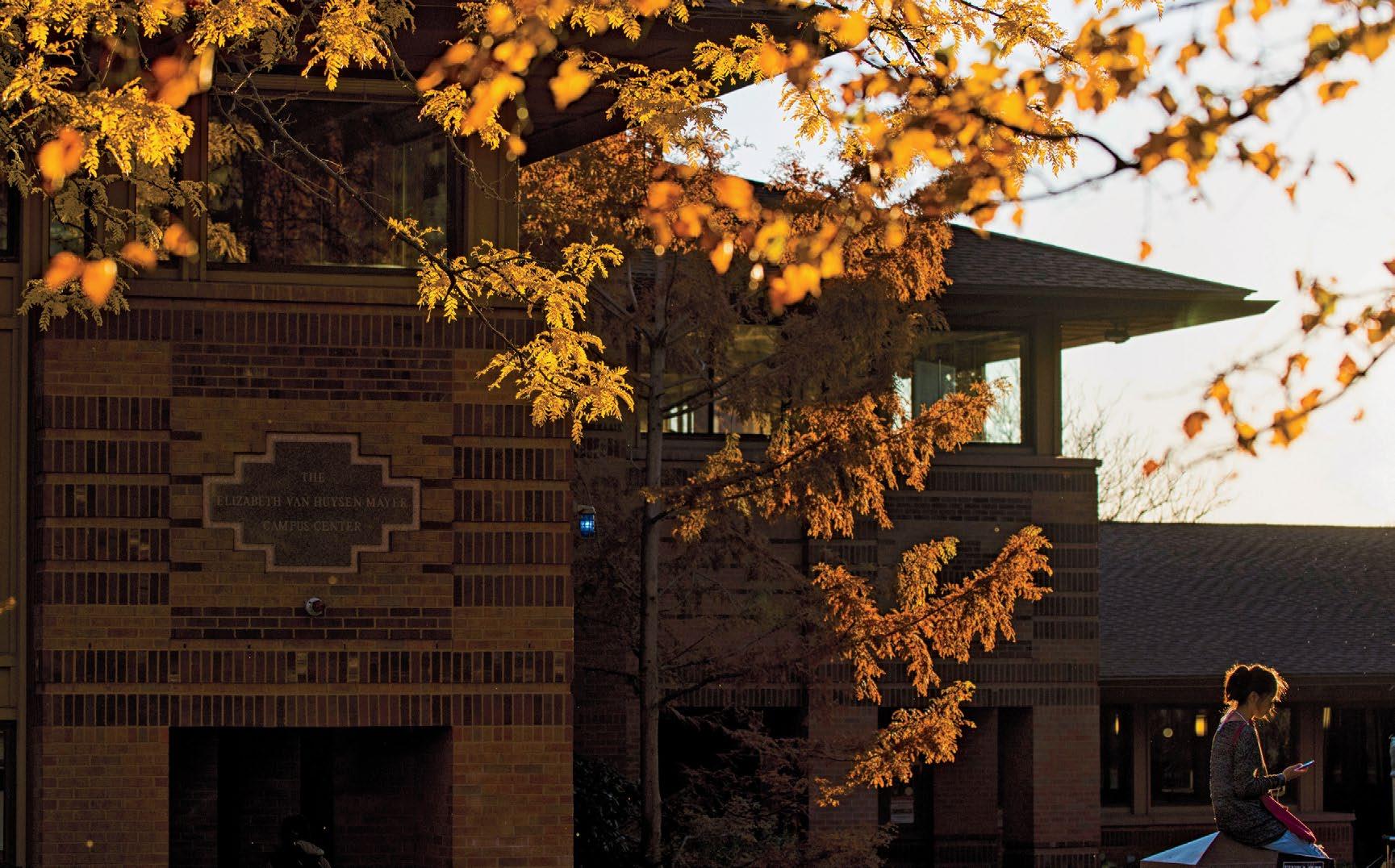
NONPROFIT ORG. U.S. Postage PAID Burlington, VT Permit No. 149
Tufts University Bendetson Hall 2 The Green Medford, MA 02155-7057 617-627-3170 admissions.tufts.edu
